THE COMMONS
For alumni and friends of the Nelson Institute for Environmental Studies at the University of Wisconsin–Madison
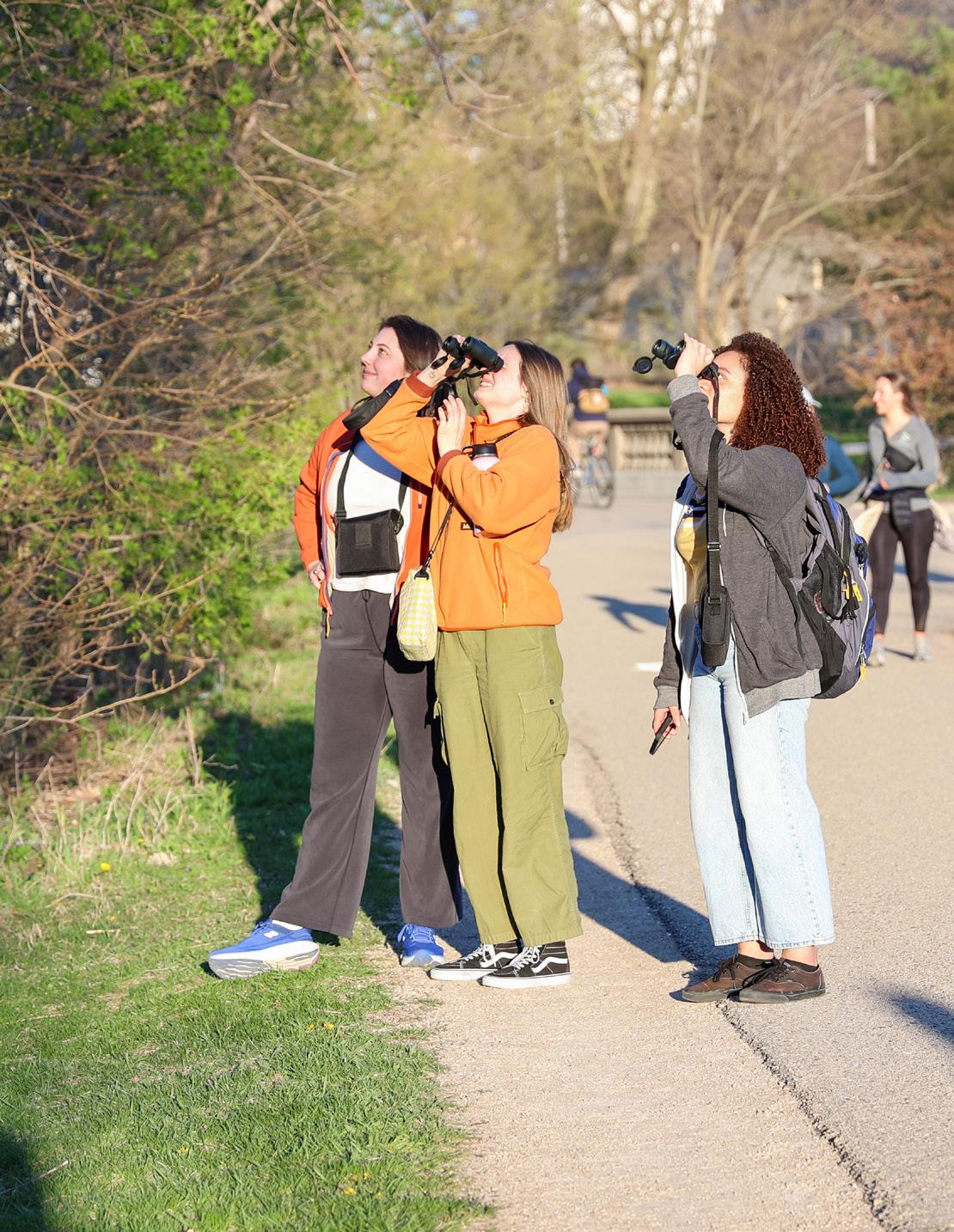
All out for Earth Fest
From April 19–26, thousands of Badgers came together to celebrate the environment.
RISE-EARTH promises 80-plus faculty hires. Page 12
Meet Ken Genskow, the new WRM chair. Page 14
Congrats, Nelson Class of 2024! Page 29
May 2024
EDITORIAL
Kevin Berger, Graphic Designer
Anica Graney, Assistant Editor
Eric Klister, Web Editor
Chelsea Rademacher, Editor
Laila Smith, Staff Writer
Diane Stojanovich, Managing Editor
CONTRIBUTORS
Abigail Becker
Lauren Graves
Elise Mahon
Marek Makowski
Heidi Zoerb
DEAN’S OFFICE
Paul Robbins, Dean, Nelson Institute for Environmental Studies
Colleen Godfriaux, Interim Director of Budget and Financial Management
Anna Gade, Associate Dean for Research and Education
Diane Stojanovich, Distinguished Associate Dean for Communications
Shelly Strom, Assistant to Paul Robbins
Ann Swenson, Associate Dean for Advancement
Steph Tai, Associate Dean for Education and Faculty Affairs
Jenna Weidner, Associate Dean for Administration
CONTACT US
We’d love to hear from you! Send us feedback or questions about this issue, or share story ideas for future issues.
Nelson Institute for Environmental Studies 550 Science Hall Madison, WI 53706 communications@nelson.wisc.edu
INSIDE
Stay connected by updating your contact information or by joining our LinkedIn group
We’re reducing our carbon footprint! We hope you enjoy our digitally published magazine, sent monthly to Nelson alumni, students, and friends.
At the Food Sustainability Roundtable Earth Fest event, seven student groups brought together more than 100 diners for a slow celebration.
Inspire, Educate, Motivate
At the inaugural Earth Fest, thousands come together to celebrate the planet — and act to ensure its future.
Environment on Display
See the winners of the first Art and the Environment competition, presented by the Center for Culture, History, and Environment.
next focus of RISE.
FEATURES 2 Breaking Bread
4
10
12
Environmental sustainability is the
New Faculty on the RISE
14 Ken Genskow, Water Resources Management 16 A Round of Applause and Awards 18 Travis Blomberg, Office of Sustainability FRONT AND CENTER 19 Director’s Cut: Michael Notaro 20 Water and Weather in Rural Wisconsin STUDENT SNAPSHOT 22 Shealynn Wegner, Environmental Studies 24 Audrey Stanton, Environment and Resources ALUMNI SPOTLIGHT 26 The Storytelling Side of Science 29 Congrats, Grads!
FACULTY/STAFF IMPACT
STAFF
Facebook Instagram Twitter Linkedin
Cover photo by Lauren Graves, Office of Sustainability
From the Dean
Greetings, Nelson community,
Well folks, that’s another semester in the books. And in case you missed it (though I hope you’ve been reading our stuff and haven’t!), this was a big semester on campus as far as environmental and sustainability efforts are concerned. We had some groundbreaking announcements from Chancellor Jennifer Mnookin: first, the unveiling of a historic environmental sustainability initiative which she announced in February; and second, the unprecedented news that, through the new Wisconsin Research, Innovation and Scholarly Excellence (RISE) Initiative, we’ll see 80 — yes, 80 — new faculty hires in sustainability and environment over the next several years. Other universities have grown their stature and commitment to the environment, absolutely, but this level of commitment is something I have seen nowhere else. It’s a game-changing, big deal, that will alter the course of the university forever, and move the needle on climate change, species extinction, and environmental justice. Stay tuned.
Chancellor Mnookin announced RISE-EARTH in the perfect setting: the Earth Fest Kickoff Celebration!
And to cap off a jam-packed semester, last weekend we welcomed nearly 400 Nelson graduates into alumnihood at the spring 2024 commencement ceremony. The Friday prior, we held our annual institute celebration for our grads, where I was fortunate enough to meet some of the remarkable young people who are sure to become changemakers and thought leaders.
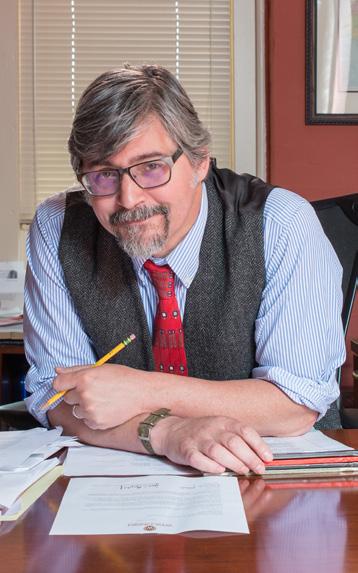
From April 19–26, we saw just how passionate our community is about making actionable change towards a more just and sustainable world. What a gratifying experience to see such interest in Earth Fest’s 50-plus educational, inspirational, and motivational events. Some initial numbers from our Earth Fest planning team show that north of 7,000 folks came out to an Earth Fest event, dozens of local news media covered our programming, and some half a million people engaged with us online. What makes Earth Fest especially spectacular was that it was truly a whole campus enterprise. All the schools and colleges participated, bringing humanities, engineering, agriculture, and social sciences from every corner of campus. “Earth Day” is a UW-wide undertaking now.
To our newest grads — and all alumni, for that matter — we’re so proud of the work you’re doing beyond the walls of Science Hall.
I hope you stay connected with us, whether it’s through sharing updates with our communications team, joining our alumni and friends LinkedIn group, or volunteering to mentor and inspire the next generation.
Happening alongside these announcement and celebrations, of course, is another semester of incredible work by Nelson faculty, staff, and students. Read on to meet folks working in everything from water resource management to rural revitalization to urban planning. Plus, head to page 14 to hear about some of the Nelson faculty who were honored locally and globally for their contributions.
All this to say, the people who make up the Nelson Institute — past, present, and future — are doing great stuff, and the world is noticing.
Be well,
 Paul Robbins Dean, Nelson Institute
Paul Robbins Dean, Nelson Institute
May 2024 1
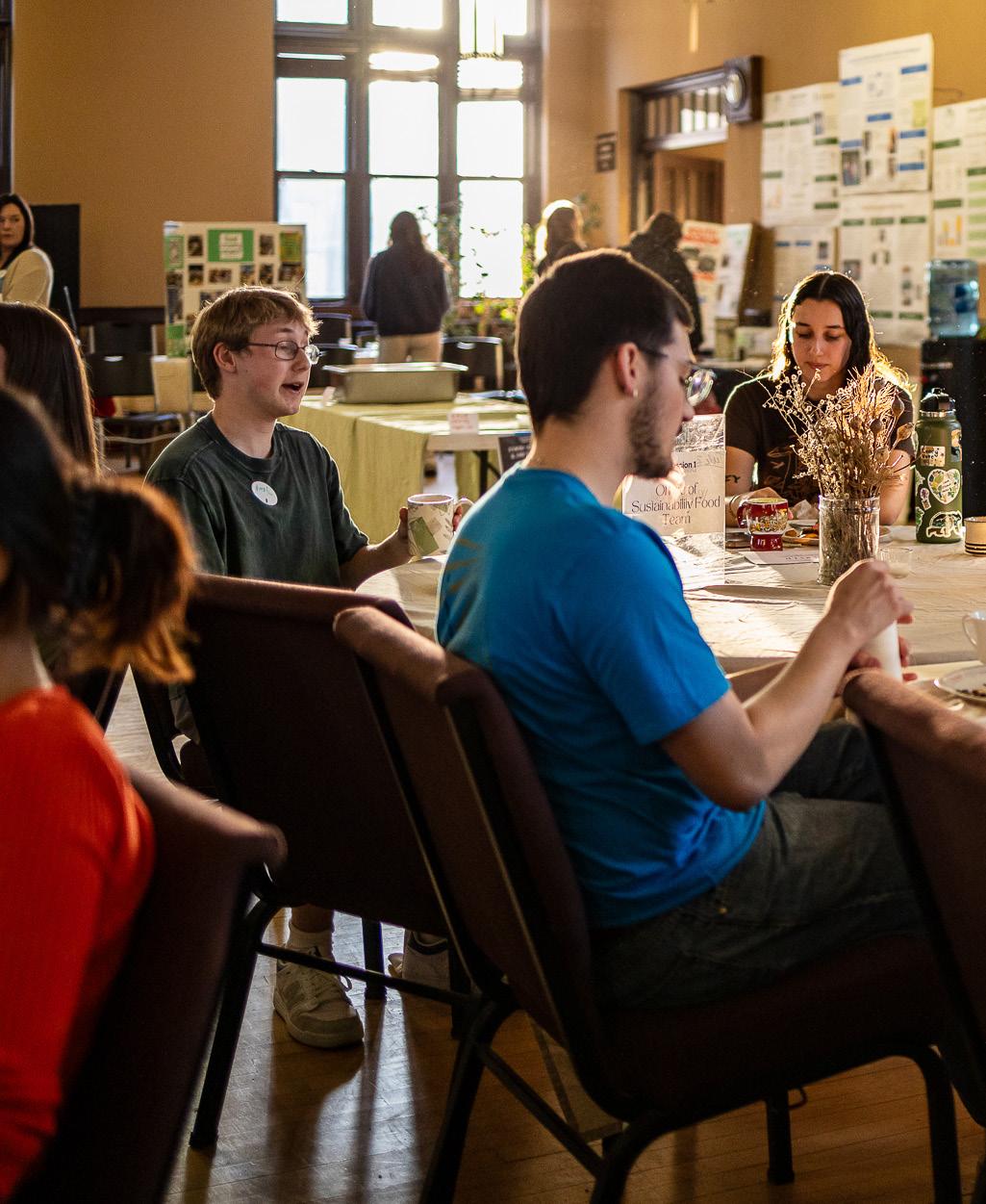
Breaking Bread
From workshops to lectures to nature walks, Earth Fest’s activities ran the gamut. But a central theme to many of the 50-plus events was food. On Wednesday, April 24, more than 100 students and community members gathered at The Crossing, a multifaith campus ministry, for the Food Sustainability Roundtable Dinner. Hosted by the Office of Sustainability Food Team, Slow Food UW, and Associated Students of Madison, the event featured a no-cost dinner, flash talks on campus food sustainability, and a forum for idea sharing.
Photo by Hedi LaMarr Rudd
Feature
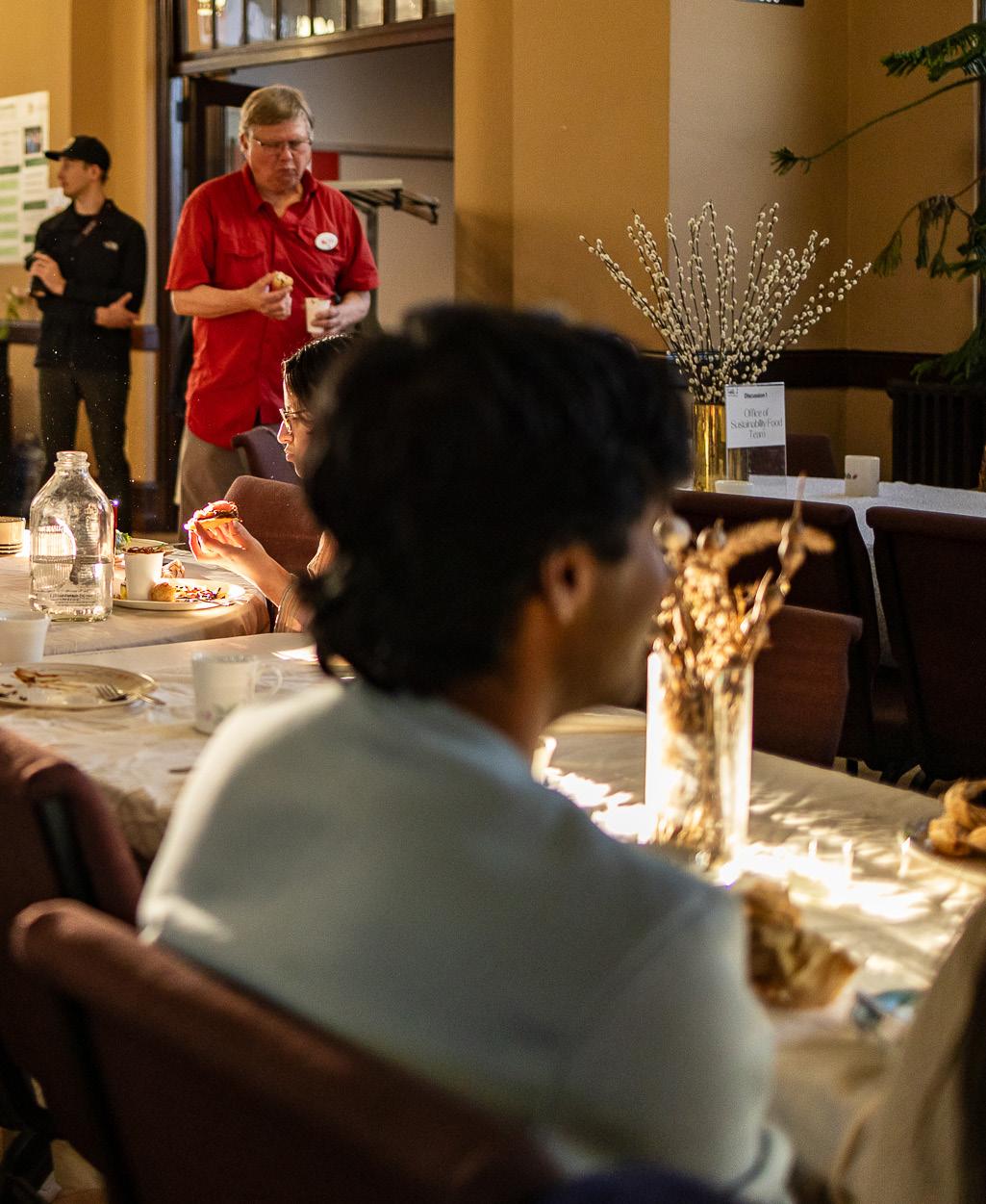
Inspire, Educate, Motivate
Community events, lectures by renowned climate experts, and a major announcement of new sustainability hires highlighted the week of programming hosted by the Nelson Institute and Office of Sustainability.
By Marek Makowski, Office of Sustainability
For 15 years, beginning in 2008, the Nelson Institute for Environmental Studies hosted an Earth Day conference, a celebration of the planet inspired by namesake Gaylord Nelson’s idea for an Earth Day teach-in. For much of that time, the conference was held off campus, at Monona Terrace, primarily for alumni, community members, and donors. Seeking to complement the Nelson Institute’s programming, in 2018 the Office of Sustainability (OS) created Earth Week, a full week of programming that was primarily aimed at, and planned by, students on campus.
For several years, the two events overlapped. But this April, Nelson and the OS joined forces to reinvent the Earth Day celebration: and so emerged UW–Madison Earth Fest.
“We were inspired by the growing momentum of sustainability efforts on campus,” said Lauren Graves, sustainability communications and engagement manager for the Office of Sustainability. “By bringing dozens of established and emerging events together under one banner, Earth Fest aimed to demonstrate the UW’s collective commitment to sustainability and to unite campus over the one resource and interest we all share: our world.”
Nelson and the OS scheduled ambitiously, hosting and supporting more than 50 events with more than 30 campus partners, but they did not foresee just how much interest would surge. Earth Fest became one of the largest cross-campus events of the year — and one of the largest sustainability events in the university’s history — with more than 7,000 attendees, including students, faculty, staff, and community members, dozens of media stories, and hundreds of thousands of social media impressions. “The increased engagement reinforces that this really is something that people care about,” said Chelsea Rademacher, communications manager for the Nelson Institute. “They’re willing to take action, they’re willing to learn, they’re willing to participate and take these things back to their home, to their communities.”
Earth Fest featured interactive community programs, such as a walk through the Lakeshore Nature Preserve
“These community-building moments help us recharge and find inspiration amidst complex challenges. They remind us that sustainability is not just a goal but a journey we are all on together.”
— Lauren Graves
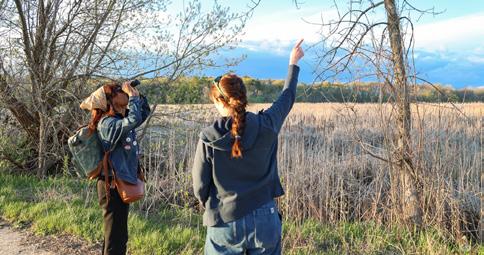
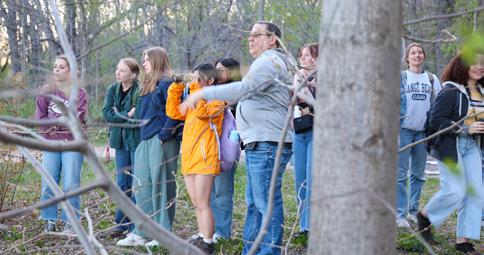
4 May 2024 Feature
hosted by the BIPOC Birding Club, and it drew major climate leaders such as Jonathan Foley, the executive director of Project Drawdown, and Tony Reames, formerly the Department of Energy’s deputy director for energy justice. Earth Fest also brought campus community members together to discuss UW–Madison’s new sustainability goals, with roundtables, planning sessions, and UW–Madison Chancellor Jennifer L. Mnookin’s major announcement of the RISE-EARTH initiative, which will bring 40 additional sustainability researchers to UW–Madison over the next year.
“Earth Fest’s range of events and partners is a testament to the breadth of existing sustainability work on campus — we couldn’t have had 50 events in our inaugural year if that momentum wasn’t already underway,” said Graves. “Earth Fest provides a platform for diverse voices and ideas to converge; it brings people together and helps build community. These community-building moments help us recharge and find inspiration amidst complex challenges. They remind us that sustainability is not just a goal but a journey we are all on together.”
Reflecting on Climate Goals
The week of programming began with the Earth Fest Kickoff Celebration, a gold-certified Green Event at the Wisconsin Institute for Discovery. After a panel of speakers shared insights on sustainability initiatives in the private sector and Kanopy Dance gave alive performance, keynote speaker Tony Reames took the stage to present on his work as the deputy director of energy justice for the Biden administration in 2022.

our sustainability efforts. The individual action that I have become most interested in is this idea of energy democracy.”
Reames’s presentation concentrated on what he called the “grand challenge:” “How do we transform our energy system in a way that ensures the new system is more equitable and just?” He spoke about President Biden’s Executive Order 14008, which claims “we have a narrow moment to pursue action at home and abroad to avoid the most catastrophic impacts of that crisis.” The executive order established the Justice40 Initiative, which stipulated that “40 percent of overall benefits of certain federal investments,” including clean transportation, climate change, energy efficiency, and clean water, “must flow to disadvantaged communities.” Reames reiterated the urgency of this initiative in a PowerPoint slide, in all caps: “WE HAVE A ONCE IN A GENERATION OPPORTUNITY TO TRANSFORM OUR ENERGY SYSTEM.”

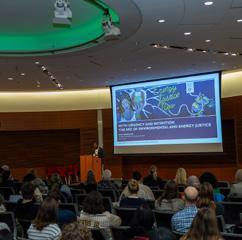
“I think we’ve gone beyond the individual actions like recycling and using our reusable bags,” he said. “Those actions are great for the grand scheme of
“A climate justice partnership supporting community-led solutions,” Reames said, “helps grassroots organizations grow their climate projects so they can access billions of government dollars dedicated to empowering communities most impacted by the climate crisis.”
Reames’s message carried into the following address, when Chancellor Mnookin announced the second RISE initiative, RISE-EARTH (Environment: Adaptation, Resilience, Technology, Humanity). RISE, Mnookin explained, works “at growing the faculty in a targeted way that builds on our existing strengths, in places where, with strategy and investment, we can accelerate discovery and world-changing research and education.” The first RISE initiative committed to hiring 50 new faculty members studying artificial intelligence. Eight deans agreed on 80 proposed sustainability hires for RISE-EARTH, which, according to the new webpage, seeks to “reimagine economic and environmental systems” and build “sustainable energy and technical systems.”
May 2024 5 Feature
Earth Fest participants enjoyed an eagle-eyed stroll from Dejope Residence Hall to Picnic Point, led by Jeff Galligan and Sean Radcliffe of the BIPOC Birding Club of Wisconsin. Photo by Lauren Graves, Office of Sustainability
Energy justice expert Tony Reames delivers the keynote address at the Earth Fest Kickoff Celebration. Photo by Hedi LaMarr Rudd
“I am excited, as I hope you are, to work together to advance the excellent progress that has already been made to address the environmental impact of our campus,” Mnookin said at the kickoff, the first event concentrating on the goals since she announced them in February. “This is what we owe to our neighbors and to all of Wisconsin — as settlers on native land, as beneficiaries of public funds, and as educators preparing our students to make a real difference in the world.”
At the Earth Fest event celebrating the history and future of energy research at UW–Madison, Nelson Institute Professor Tracey Holloway spoke to the progress, and promise, the RISE-EARTH hires represent.
amounted to goals, including advocating for more sustainability course offerings across disciplines and seeking meetings with deans and professors to voice students’ concerns about the university’s environmental leadership.
Sanauz Alaei, a master’s student at the University of Miami’s Coral Reef Future Lab, and Katie Piel, an environmental, social, and governance (ESG) consultant for the largest utility management company in the country, each interned with the Office of Sustainability and served as ASM Sustainability Committee chairs. Both praised the sustainability goals as the result of decades of student climate activism.
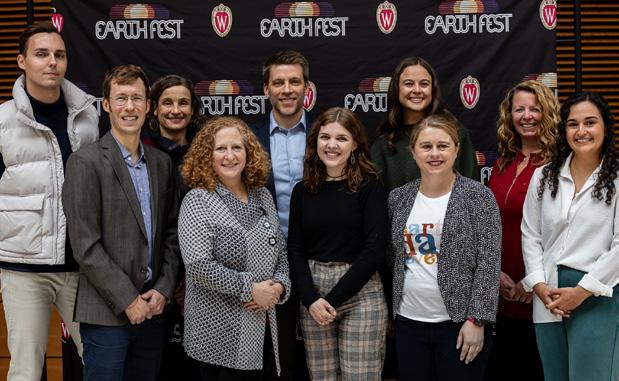
“Your fear as a student when you’re leaving is: I really hope that those four years that I put in was doing something and was meant for something ... [You’re] trusting your community and the faculty and staff here at UW–Madison to continue that momentum,” Piel said. “They really did, and it means so much to me that that’s happening, and it makes me so proud to be a Badger.”
Christina Treacy, the outgoing ASM sustainability chair, similarly attributed the goals to student activism, such as through the creation of the Student Sustainability Advisory Council.
“Each hire to this university is transformative,” she said. “The operational goals of the university go hand-in-hand with our educational goals, our research initiatives — this is the direction that the world is heading, and it’s great to see Wisconsin as a leader in this space.”
To close the Earth Fest kick-off celebration, Nathan Jandl, the associate director of sustainability, moderated a panel of students, alumni, faculty, and staff “to discuss and celebrate not only the work we’re doing now and into the future but the years of effort that have gone into making this moment possible.” Ann Terlaak, who directs the Wisconsin School of Business’s graduate certificate in business, environment and social responsibility, called students “a beacon” for sustainability action and moral conscience, and the students on the panel reflected on their efforts that
“A significant amount of students take sustainability and environmental initiatives and opportunities into account in admissions decisions,” Treacy said, citing the results of recent ASM sustainability surveys. “These goals give a language for talking about these efforts that are happening … and they provide us a framework to move forward and accomplish them.”
Global Thinkers, Local Actions
During his lecture, Jeff Goodell, the bestselling climate journalist and former Guggenheim Fellow, recounted when he came up with the idea for his latest book, The Heat Will Kill You First: Life and Death on a Scorched Planet (2023). It was June in Phoenix, and he was late, so Goodell decided to run 20 blocks from his hotel room to a meeting downtown. Soon he felt lightheaded, his heart pounding and his clothes heavy with sweat.
“It happened really quickly,” he said of his illness on the 115-degree day. “But it also happened very slowly,
6 May 2024
Feature
Gathering to celebrate the Earth Fest Kickoff, left to right, are graduate student Marek Makowski; Green Fund manager Ian Aley; business professor and sustainability advisor Ann Terlaak; Chancellor Jennifer L. Mnookin; associate director of sustainability Nathan Jandl; ASM sustainability chair Christina Treacy, former student and sustainability intern Katie Piel; director of sustainability education and research Andrea Hicks; chief sustainability officer Missy Nergard, and former student and ASM chair Sanauz Alaei. Photo by Bryce Richter / UW–Madison
“You can make an argument that Madison is the epicenter of environmental consciousness in America.”
— Jeff Goodell, New York Times bestselling author
because I had been writing about climate change for 20 years, and it never occurred to me that heat could be dangerous, that it could kill you fast. That was a really profound realization for me.”
“A lot of people have these moments in different ways,” Goodell said, speaking of epiphanies — “oh shit moments” when we realize the imminent danger of the climate crisis. As a response, Goodell sought to write The Heat Will Kill You First, “to communicate, on a cellular level, what happens with the body due to heat,” the “driver of planetary chaos” such as broadened disease patterns, drought, sea level changes, wildfire smoke, migration, and extinction.
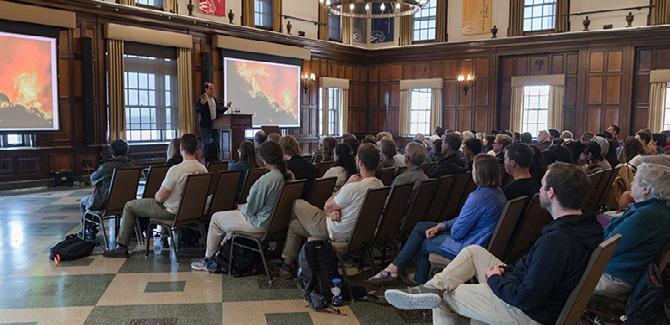


Across Earth Fest, speakers shared similar epiphanies that inspired action. Each of the speakers on the Wisconsin Energy Institute panel did so, and they looked to the future of climate action at UW–Madison as one rooted in interdisciplinary and care for the state.
“We have the Wisconsin idea, and that is a value that the role of the university is to engage in real issues in the state,” Holloway said. “These new ideas around energy were hatched to address applied problems right here in Wisconsin.”
Jonathan Foley lectured on his findings with Project Drawdown, which provides insights in the “race between the world going to hell in a handbasket and the world actually getting better.”
“We shouldn’t just listen to the person shouting the loudest telling us what we need to do to solve some of the most complex, most challenging problems in human history,” Foley said. “Maybe we could trust science to figure out what we need to do.”
Foley surveyed “what actually would work to stop climate change” — not carbon capture, which to this day “has removed a total of four seconds of our emissions,” but an immediate reduction in emissions, the stoppage of deforestation, and a change in the public imagination.
Still, Foley noted, “science is definitely, definitely, definitely not enough.” To build on the insights of science,
May 2024 7
Jeff Goodell talks to a full house at Memorial Union’s Tripp Commons on Monday, April 22, during Earth Fest. Photos by Todd Brown/SMPH Media Solutions (3)
bestseller The
Andrea Dutton, researcher in the Nelson Institute’s Center for Climatic Research and Jeff Goodell talk about the realities of rising temperatures. Goodell
is the author of the
New York Times
Heat Will Kill You First
Feature
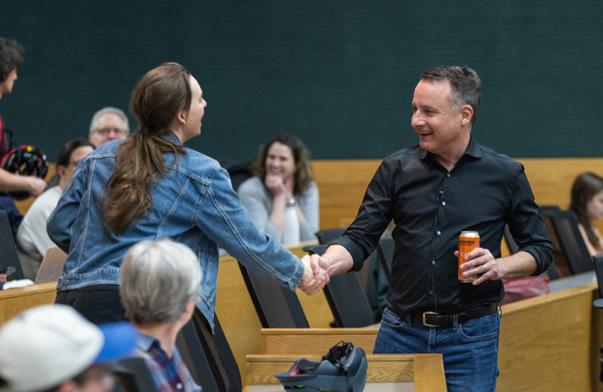

total of around 150 people
and
Foley noted that “we need big dreams. We’re stuck in a bloody nightmare right now of fear and polarization and anxiety around climate change. We don’t have to be afraid; we don’t have to be polarized. In fact, we could be the opposite.”
Hope, Dreams, Collaboration
Several other Earth Fest events brought hope and collaboration. Community members came together to remove trash from the trails of the Lakeshore Nature Preserve, workshop the draft Zero Waste Action Plan, covert old T-shirts into tote bags, swap used clothing, cut down brush at the UW Arboretum, plant seeds at the Eagle Heights Community Garden, and discuss
sustainability at the Climate and Justice Teach-in.
Students from Sara Holwerda’s textile design class (DS 227) displayed their experiments with natural dyes — swatch books of local marigolds, red onion skins from a dining hall, avocado skins from a local taco restaurant, coreopsis from Allen Centennial Garden. The students explained their discoveries with sustainable dyeing practices and helped attendees dye and pattern strips of fabric in sustainable indigo vats.
“The one area where we succeeded, right from the get-go, was always when we followed the students. When we follow the students, and follow their lead, and respond to their calls, good things happen.”
—
Ann Terlaak, associate professor of Management and Human Resources
“It feels like you’re slowing down, and you’re learning the actual process that goes into making a garment,” said Eli Song, a fashion design major and one of the students in Holwerda’s class. “UW is a big resource to see how many people are using sustainability and thinking about no-waste garments and natural dyes. It gives me a little hope that it is possible to change these inset ways [of fast fashion] from major companies.”
At one of the most populous events, attendees learned about the new aquaponics system at the D.C. Smith Greenhouse. The project, supported by the Green Fund and designed and installed by the student group Engineers for a Sustainable World, converts waste produced by tilapia into nutrients that facilitate the growth of hemp. The recirculating system uses no chemicals, fertilizers, or pesticides and requires 10 percent of the water that would have been needed to grow the cannabis outdoors. Students research growth the system encourages, and several classes have toured the greenhouse to learn from the setup.
8 May 2024
A
— in person
online — joined Jonathan Foley for his Earth Fest address on Thursday, April 25.
Jonathan Foley mingles with faculty, staff, and students before his talk at Earth Fest. Photos by Sirtaj Grewel/SMPH Media Solutions (2)
Feature
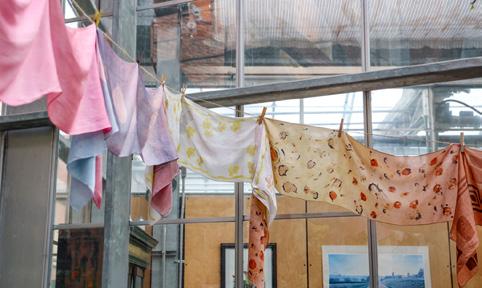
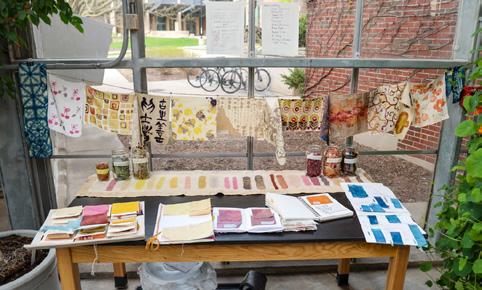
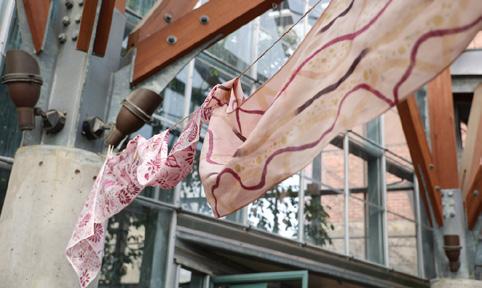
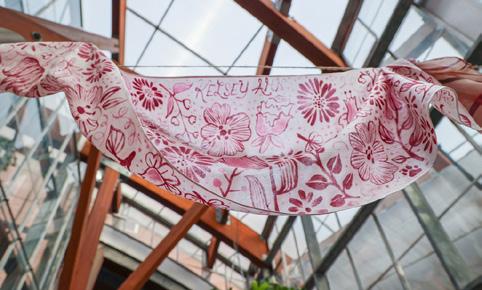
“This is the kind of interdisciplinary work — engineers interacting with biologists to try to solve some big-world problems — that we want our young people to be doing,” said Patrick Krysan, the chair of the Department of Plant and Agroecosystem Sciences.
Rademacher attended the event and watched as children, college students, community members, faculty, and staff interacted, creating little hydroponic stations of their own. Seeing the interactions, she said, showed her “how rewarding true collaboration can be, bringing in people from across campus and across the community, with different voices to the table at the start.”
“Earth Fest, in its first year, proved to the campus community that sustainability and the environment are something that people care greatly about and are becoming more interested in,” she said. “There are a lot of scary statistics and things that make you feel like you can’t make a difference, but then to see so many people show up in person to participate — whether it’s attending a lecture to really dive into how methane emissions are rising or an event to make a fairy house — showed me that people are willing to pitch in and do something. They do care, they are interested, and that really helps with some of that eco-anxiety that we all feel.”
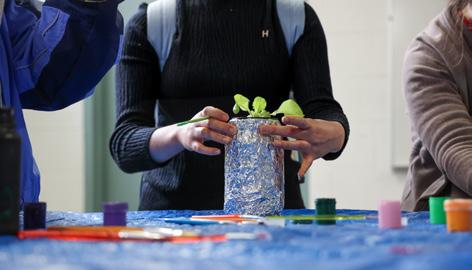

future Badger investigates D.C.
May 2024 9
Students in the School of Human Ecology led a natural-dye demonstration and workshop at D.C. Smith Greenhouses. Photos by Lauren Graves, Office of Sustainability (6)
Feature
Participants at The Big Splash: Aquaponics Open House and Hydroponics Workshop make their own windowsill hydroponic stations. A
Smith Greenhouses new aquaponics system.

Environment on Display
See the winners of the first Art and the Environment competition, presented by the Center for Culture, History, and Environment.
Part of the Earth Fest kickoff celebration on Friday, April 19, included an art exhibition highlighting entries from the Nelson Institute’s Center for Culture, History, and Environment’s first Art and the Environment awards. “The environment is facing a profound crisis. Humanity needs more voices creatively engaging with the most critical issue facing all life,” the contest prompted. “Art can be an essential part of the discussion addressing this pressing issue.” Out of 17 entries, 13 pieces were selected to be displayed in the Discovery Building during the kickoff festivities.
Undergraduate Winners
First Place: Avery Ponto, Textiles & Fashion Design ’24
Zero Waste Garment
“Although much of the waste produced in the fashion industry comes from the disposal of garments by consumers, 35 percent of all materials in the fashion supply chain become waste before a garment ever reaches the consumer. Through my dress design, I aim to address lesser-known culprits in the fashion industry — pre-consumer waste and toxic dyes. … Through my design and production methods, I hope to remind fashion producers that zero-waste garments are not only possible to make but can be done so in modern and beautiful ways.”
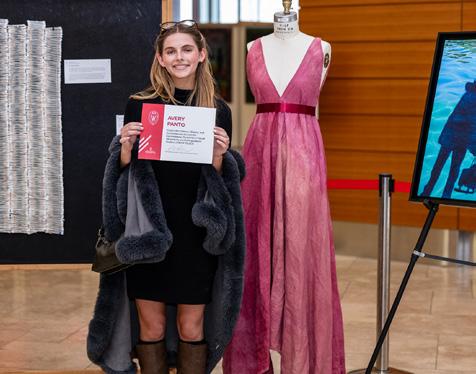
10 May 2024 Feature
Nelson Institute Professor Tim Portlock (left) and Center for Culture, History, and Environment (CHE) faculty associate Tomiko Jones (right) with the winnners of the first CHE Art and the Environment Awards. The winners were announced at the Earth Fest Kickoff Celebration on Friday, April 19. Photos by Hedi LaMarr Rudd (5)
Avery Panto
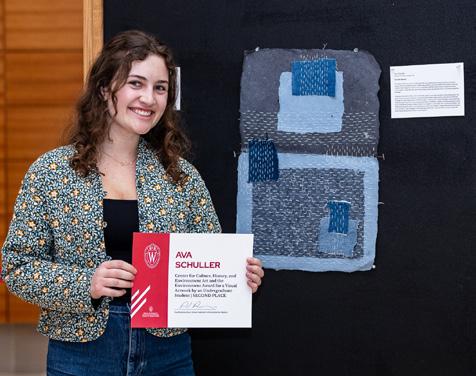
Third Place: Madelyn Anderson, Environmental Studies and Life Sciences Communication ’25
Water Prayer
“I often find myself sitting near the shore, trying to learn from the waves. The words in this piece are part of a larger water prayer, where I ask the waves many questions: Will you hold my weight? How do you reflect light? Is it only surface level? The question ‘Will you wash us clean?’ has been pressing on my mind. Anthropogenic actions have caused deep environmental damage. As this piece illustrates, there are over 1,000 impaired rivers and streams in Wisconsin. To evoke emotion and action about this, I worked with a GIS map of these waterways, using cyanotype to transfer the words and imagery to fabric via the sun.”
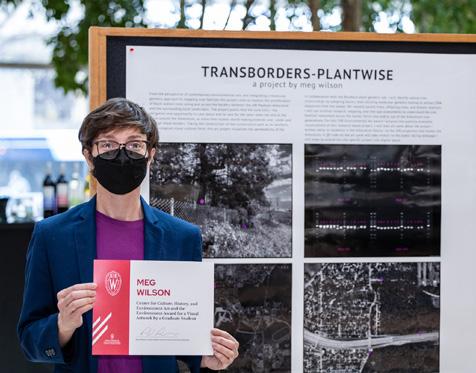
Second Place: Ava Schueller, Textiles & Fashion Design ’25
Circular Denim
“The objective for my work is to demonstrate a circular economy and promote sustainable design within the textile industry. …. My work utilizes fiber waste, specifically denim, to communicate this message. I transform old denim fibers into handmade paper [and] combine the sheets of paper using a stitching method inspired by the ancient Japanese [mending] practice of Sashiko. In my artwork, I pay homage to the mending method, but I also wanted to communicate the idea of generating new life from something old.”
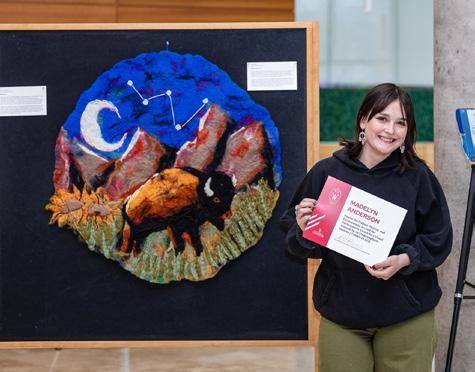
Graduate Winner
Meg Wilson, Department of Art History PhD student transborders — plantwise
“From the perspective of contemporary environmental arts, and integrating a molecular genetics approach to mapping tree families, this project aims to explore the proliferation of black walnut trees along and across the borders between the UW Madison Arboretum and the surrounding built landscapes. The project posits that the land ethic—the obligation and opportunity to care about and to care for the land—does not end at the fence around the Arboretum, as more-than-human world-making extends over, under and through these borders. Taking the construction of the conservation park as an aesthetic and ecological visual cultural form, this art project visualizes the permeability of the supposed border.”
May 2024 11 Feature
Ava Schuller
Madelyn Anderson
Meg Wilson
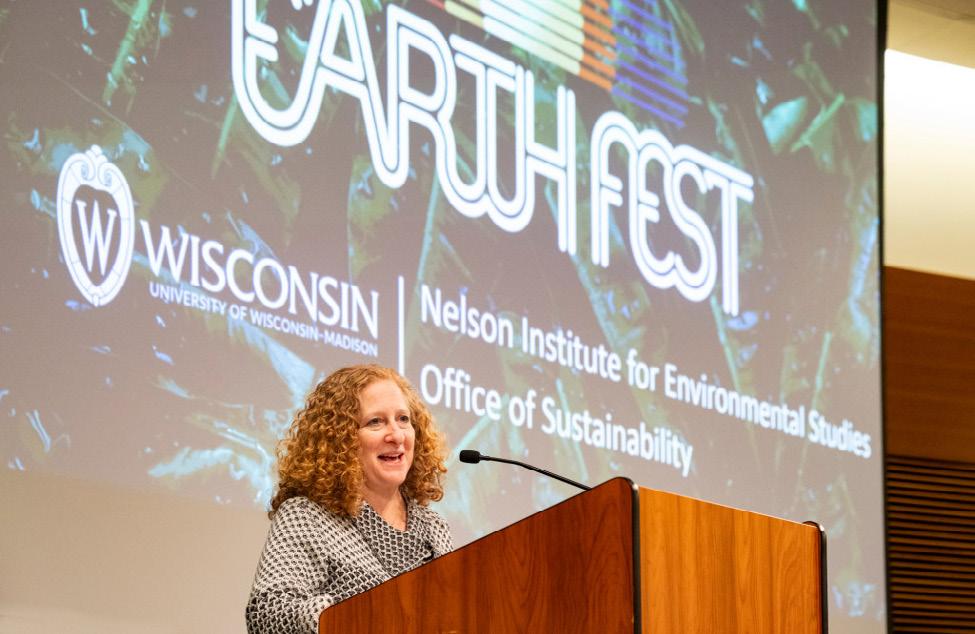
New Faculty on the RISE Environmental sustainability is the next focus of RISE.
By Elise Mahon, University Communications
“We are excited to build on our existing strengths to create new technologies and innovations that we can share with campus, all of Wisconsin and beyond.”
— Paul Robbins
At the kickoff celebration for Earth Fest, Chancellor Jennifer L. Mnookin announced the next area of focus under the Wisconsin Research, Innovation and Scholarly Excellence (RISE) Initiative: RISE-EARTH.
The Wisconsin RISE Initiative, which Mnookin first announced in February, is designed to help address significant, complex challenges of particular importance to Wisconsin and the world, through accelerated and strategic faculty hiring, research and infrastructure enhancement, interdisciplinary collaboration and increased student opportunities. RISE-AI (artificial intelligence) was the first area announced under the new initiative.
Now, RISE-EARTH, the latest RISE effort, will strengthen the university’s ability to address complex problems and opportunities related to the environment, translating discoveries into tangible benefits at home in Wisconsin and beyond.
RISE-EARTH, which stands for Environment: Adaptation, Resilience, Technology, Humanity, will center on two themes. The first is to reimagine economic and en-
12 May 2024 Feature
UW–Madison Chancellor Jennifer Mnookin speaks to attendees at the Earth Fest Kickoff Celebration and discussion panel. Photos by Bryce Richter / UW–Madison (3)
vironmental systems to, for example, find innovative ways to revitalize communities with new modes of transportation or renew agricultural lands to reduce erosion and enhance biodiversity. The other will be aimed at building sustainable energy and technical systems — for instance, developing new clean energy technologies and ways to capture and store carbon.
“UW–Madison has long been a leader in responding to community-identified environmental challenges, and in developing solutions to problems that can be put immediately into action,” says Mnookin. “By investing in the next generation of faculty leaders through RISEEARTH, UW–Madison will be well poised to make even greater contributions to sustainability research, education and problem-solving in the world.”
RISE-EARTH complements a campuswide sustainability initiative Mnookin unveiled earlier this year, setting bold goals for UW–Madison, including changes to campus energy use; ensuring that sustainability is an accessible part of student education; launching a sustainability research hub to support large, interdisciplinary grants and drive innovation; and more.
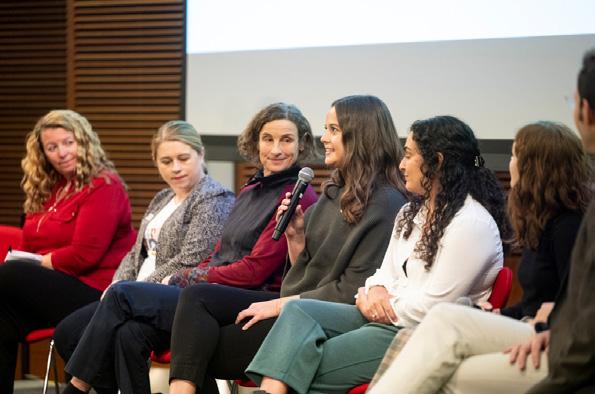
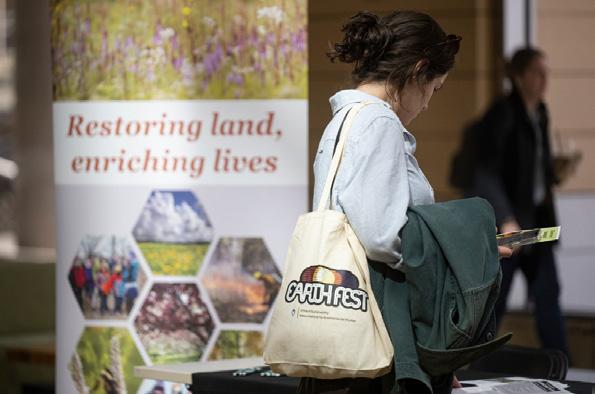
“We are excited to build on our existing strengths to create new technologies and innovations that we can share with campus, all of Wisconsin and beyond,” says Paul Robbins, dean of the Nelson Institute for Environmental Studies. “RISE-EARTH will allow us to build sustainable energy systems and transition to new economic systems while also creating new research and educational opportunities.”
For decades, researchers at UW–Madison have explored sustainability across a variety of fields, from economics to policy, to chemistry and engineering. The university is a demonstrated leader in sustainable systems innovation.
For example, UW–Madison researchers laid the foundation for the study of wildlife ecology, pioneered remote sensing of Earth’s resources, and were some of the first to push business systems to account for problems deep in corporate supply chains.
“UW–Madison is well known for high-impact research led by our impressive faculty, and RISE-EARTH will help bring new thinkers with bold ideas to campus that will help fuel greater interdisciplinary collaborations,” says Provost Charles Isbell. “Challenges like those we face to achieve carbon neutrality, future-proof our economy and prepare tomorrow’s sustainability leaders are best tackled when people across multiple disciplines come together to create solutions. RISE-EARTH will help us bring new ideas to students, the state and the world.”
Hiring for the initiative will begin in fall of 2024, with 40 hires planned over the next several years. Learn more about other RISE initiatives, like RISE-AI, and how you can suggest the next focus area online.
This story was originally published by UW–Madison News.
May 2024 13 Feature
Top: A panelist speaks to attendees at the Earth Fest Kickoff Celebration and discussion panel held in the Discovery Building. Above: Attendees look at information booths at the Earth Fest Kickoff Celebration.
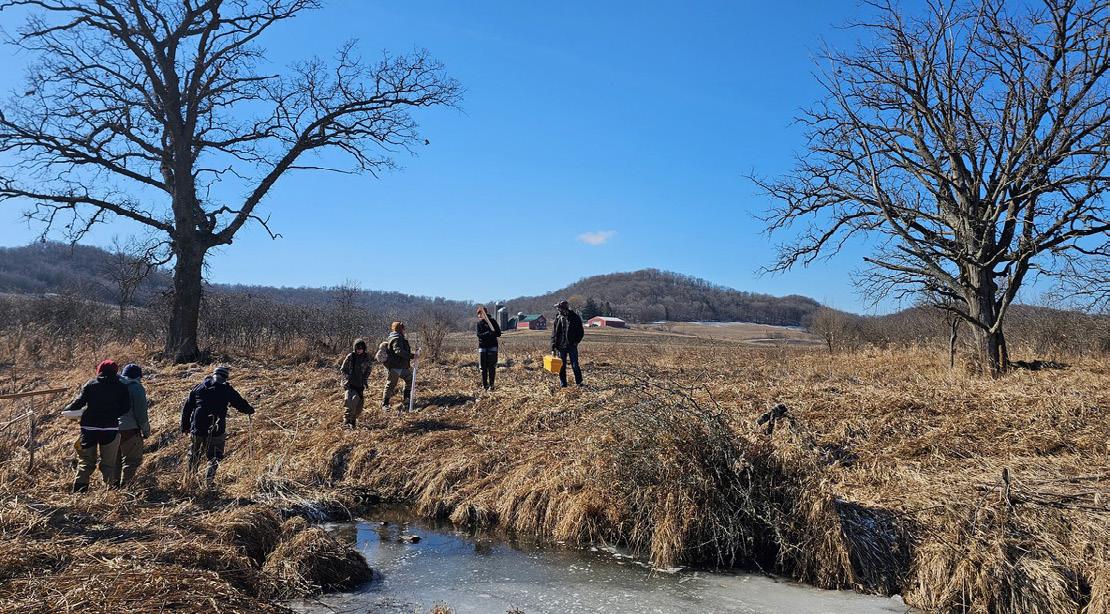
Watershed Management and Words of Motivation
An expert on watershed management and planning, incoming chair Ken Genskow shares his thoughts on the water resources management program.
By Laila Smith
If you asked Ken Genskow for advice on watershed planning and management, he would tell you to always anticipate change. “Things are always changing … it’s the one constant in this field,” he says. Genskow has encountered his own fair share of “change” throughout his career path — he graduated from the University of Illinois Urbana-Champaign (UIUC) with a bachelor’s degree in general engineering, but soon realized he wanted to switch gears to doing environmental work. He then joined the Peace Corps and was assigned to Nepal for three years, working as an urban planner and engineer.
Genskow was unfamiliar with the field of urban planning, but grew to love the work he did with the Peace Corps. Upon returning to the United States, he returned to UIUC for a master’s degree in urban planning, where he discovered a particular interest in natural resources planning. He furthered his interest at the University of Wisconsin–Madison, pursuing a PhD in urban and regional planning. After graduating, he worked in watershed planning with the UW–Madison Division of Extension, which




led to a faculty position in what is now UW–Madison’s Department of Planning and Landscape Architecture. He’s currently a professor, state extension specialist, affiliate of the Nelson Institute, and was recently named the chair of the Nelson Institute’s water resources management (WRM) program.
Are you currently working on any projects or research? I recently received funding to lead a project with Paul Block [Nelson’s Reid A. Bryson Distinguished Professor of Climate, People and Environment], and [Wisconsin State Climatologist] Steve Vavrus. The project is helping communities in rural Wisconsin prepare for extreme weather impacts. With this project, we’re able to focus on the specific needs of farmers, agricultural advisors, hazard and emergency planners, and school districts, and how they’re going to address climate adaptation issues.
Is there a past project that’s stood out to you as a favorite?
A lot of my work is focused on the human dimensions of watershed planning and management; how we make decisions, what influences those decisions, and how our responses — both through governmental action and individual land management — relate to the environment. Almost 20 years ago, I was part of a project that was a partnership between the U.S. Environmental Protection
14 May 2024
FACULTY | STAFF IMPACT
The 2024 WRM cohort visiting Fancy Creek in Richland County, Wisconsin. Photo by WRM student Norman Arif Muhammad
Agency and several land-grant universities across the region, including UW–Madison. We created a program called Social Indicators for Nonpoint Source Pollution, and that’s been really gratifying. Recently I’ve been working with some of my colleagues on a retrospective of that. It’s very much still useful and relevant — there are groups in Wisconsin and in most other states who are using our approach for some of their watershed planning work.
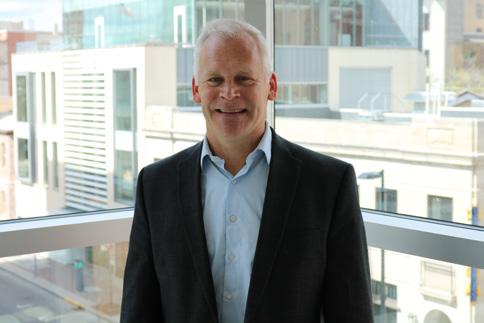
“This is a really rich environment for people interested in learning about and protecting water, and a great way to get involved is through the WRM degree.”
— Ken Genskow
What are some of your responsibilities as the chair of the water resources management program?
The role focuses on connecting with students about the WRM program and studies, as well as supporting relationships with students, faculty, and staff across campus. We’re also working on reinforcing connections with alumni, such as creating an initiative identifying ways for alumni to interact with current WRM students.
What should students take away from the WRM program?
I want students to leave the program with the confidence that they have the ability to approach any water resource management challenge. They will know where to begin and how to engage others in addressing those problems. It’s a very interdisciplinary program, so you can’t expect any individual to know everything, but we emphasize collaboration and working in teams in order to assemble resources to address any environmental problem.
What would you say to people considering a master’s degree in the WRM program?
Wisconsin is a great place to study water. This is a rich environment for people interested in learning about and protecting water and a great way to get involved is through this degree program. It’s wonderful for addressing real-life water resources challenges and environmental problems. I encourage anyone to talk to me, other faculty, and alumni to get a sense of the breadth of issues that people learn about and work towards solving in the WRM program.
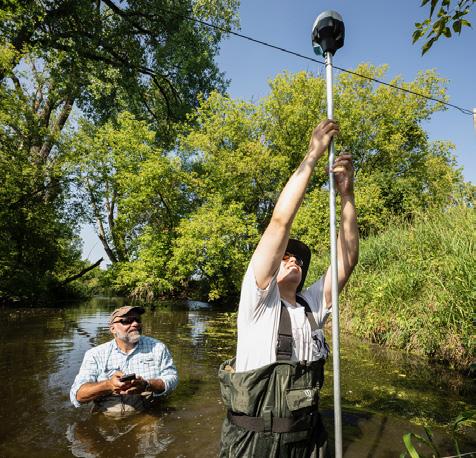
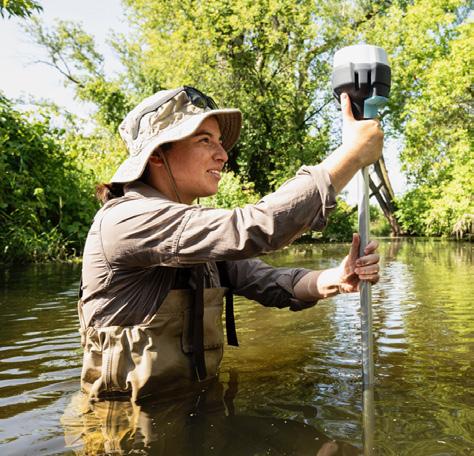
May 2024 15 FACULTY | STAFF IMPACT
Top: WRM student German Gonzalez and instructor Ed Boswell conducting field work on Koshkonong Creek in summer 2023. Above: WRM student Hannah Agner in Koshkonong Creek, summer 2023. Photos by Bryce Richter / UW–Madison (2)

A Round of Applause and Awards
Thanks to superb faculty, the Nelson Institute’s proverbial trophy case is growing.
By Chelsea Rademacher
FACULTY | STAFF IMPACT
As the spring semester comes to a close, so does a semester’s worth of academic awards. From regional to national to global organizations, Nelson Institute faculty, staff, and affiliates are representing UW–Madison with their excellence in teaching, research, and outreach. Here are some of the awardees from the spring 2024 semester:
Louise Hemstead Leadership Award
UW–Madison College of Agricultural and Life Sciences, April 2024
Awardee: Monica White
More about the award
Vilas Distinguished Achievement Professorships
UW–Madison Office of the Provost, April 2024
Awardees: Caroline Gottschalk Druschke, Claudio Gratton
About the Vilas professorships and awards
Vilas Faculty Early Career Investigator Awards
UW–Madison Office of the Provost, April 2024
Awardees: Line Roald, Daniel Wright
Vilas Faculty Mid-Career Investigator Awards
UW–Madison Office of the Provost, April 2024
Awardees: Holly Gibbs, Elizabeth Hennessy, Erin Silva
Exceptional Service Award
UW–Madison Office of the Provost, April 2024
Awardee: Hannah Zanowski

Cozzarelli Prize, Class V: Behavioral and Social Sciences Finalist
Proceedings of the National Academy of Sciences (PNAS), March 2024
Awardee: Holly Gibbs for “Agricultural intensification and childhood cancer in Brazil”
About the Cozzarelli Prize
Most Impactful Research Finding
The “Organic Oscars,” hosted by The Organic Center and Organic Voices, March 2024
Awardees: Horacio Aguirre-Villegas, Becky Larson, Michel Wattiaux, and Erin Silva for “Farm level environmental assessment of organic dairy systems in the US”
About the Organic Oscars
Nelson Institute faculty, staff, and students: share your news with us!
FACULTY | STAFF IMPACT
From the Office of Sustainability
A monthly update from faculty, staff, and students in the Office of Sustainability - Education and Research. This month’s column is from Travis Blomberg, campus resource coordinator.
“Where are the compost bins on campus?” Trash talk or genuine inquiry? Either way, you’re not the only one wondering. This common curiosity is part of the broader discussion about sustainability and waste management at UW–Madison, a discussion your feedback can influence. We invite you to help steer this conversation by providing your input on our draft Zero Waste Action Plan by June 30.
The Zero Waste Action Plan refines strategies for UW–Madison’s ambition of achieving zero waste by 2040, a goal announced by Chancellor Mnookin in February 2024. This plan, developed over three years through the support of over 1,000 student hours, outlines our path to zero waste and includes 17 draft proposals for infrastructure and staffing updates, logistics improvements, and new programs and initiatives.
Background and Student Leadership
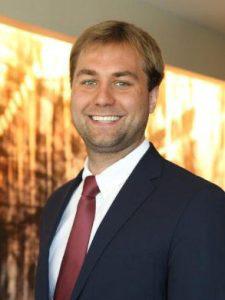
UW–Madison students completed the three-stage Atlas Zero Waste Fellowship Program to help develop its Strategic Initiative for Sustainable Materials Management known as UW Zero Waste. The Office of Sustainability’s Zero Waste Project Assistants and its Campus Resource Coordinator engaged its cross-functional UW Zero Waste Team to pursue a third party zero-waste certification (Stage 1), complete a Strategic Vision (Stage 2), and draft a Zero Waste Action Plan (Stage 3).
In Stage 3, the Zero Waste Project Assistants (Rachel Schumacher, Olivia Grose, Emily Johnson, Carolyn Shumaker) facilitated a series of planning sessions with key campus stakeholders to establish a draft Zero Waste Action Plan, including a budget, timeline, and accountability reporting structure. This was an extension of the Strategic Vision, which served as a proposal to campus administration for establishing cross-departmental solutions to sustainable materials management. In Stage 2, The Zero Waste Projects Assistants facilitated meetings with campus stakeholders through a constructive process of reviewing the Stage 1: Zero Waste Assessment, identifying system-wide gaps, and conducting visioning sessions to achieve zero waste.
How You Can Help
1. Complete the feedback survey by June 30. To review the plan and share your feedback, please visit zerowaste.sustainability.wisc.edu.
2. Subscribe to the Office of Sustainability’s newsletter to learn about new zero-waste opportunities.
3. Take advantage of UW–Madison’s PLAN Membership benefits, including a discount directory, event opportunities, digital resources/manuals, and leadership courses.
4. Contact the UW Zero Waste Team for more information on how you can get involved!
18 May 2024 FACULTY | STAFF IMPACT
Travis Blomberg
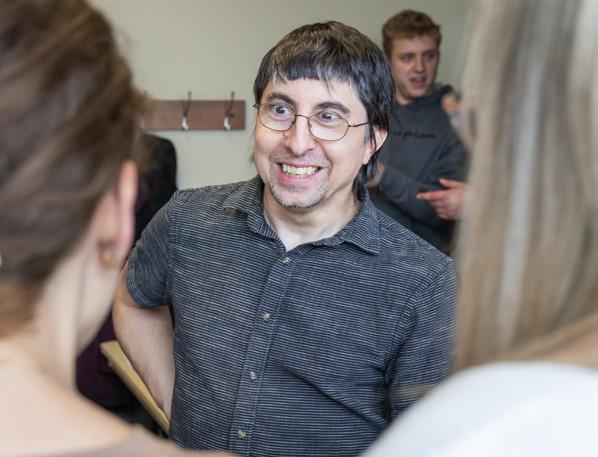
Director’s Cut
A quarterly update from Michael Notaro, director of the Center for Climatic Research
The Center for Climatic Research (CCR) has been actively expanding its efforts to support diversity, equity, and inclusion (DEI). CCR contributed towards the development of the Atmospheric, Oceanic, and Space Science (AOSS) Code of Conduct, with focus on respect, inclusion and equity, professionalism, integrity, and education and scholarship.
Hannah Zanowski, Mayra Oyola-Merced, and Ankur Desai are leading the Student Training in Oceanography, Remote Sensing, and Meteorology (STORM) National Science Foundation (NSF) Research Experiences for Undergraduates (REU), which focuses on the three pillars of exposure, enrichment, and empowerment and encourages participation by community college students, tribal college students, and students from historically excluded groups.
Angela Waupochick is expanding a forestry traineeship program designed by members of the Menominee and Stockbridge-Munsee Communities, which engages students in climate and forest research to perpetuate a legacy of responsible resource managers in the new era of climate change.
Simon Goring and Jack Williams are supporting the translation of core documentation from the Neotoma Paleoecology Database into other languages in order to improve support for underrepresented communities worldwide.
My NSF grant supports two camps for autistic middle and high school youth that foster neurodiversity, namely The Sky’s The Limit STEM Camp and Nature’s Navigators STEM Camp, along with Muddy Waters STEMinist Camp for girls. Each summer, I teach AOS 100 Weather and Climate through the Summer Collegiate Experience program for incoming first-generation college students, largely from diverse racial and ethnic backgrounds.
CCR is partnering with Reflo, an environmental organization in Milwaukee and the Medical College of Wisconsin on greening schoolyard redevelopment projects, including support for the greening of the Milwaukee Sign Language School, mapping of the reduction in the urban heat island effect and benefits to youth health, and K-12 educator professional development in citizen science.
Furthermore, CCR is expanding its partnerships to the Henry Vilas Zoo, to develop an autism STEM day, and the Richardson School, to implement field trips and hands-on science experiments for autistic youth and youth with developmental and neurological disabilities. There is certainly much more work to be done to advance DEI in this era of climate change, but CCR has accepted the challenge.
 Michael Notaro
Michael Notaro
May 2024 19 FRONT AND CENTER
Photo by Sirtaj Grewel/SMPH Media Solutions
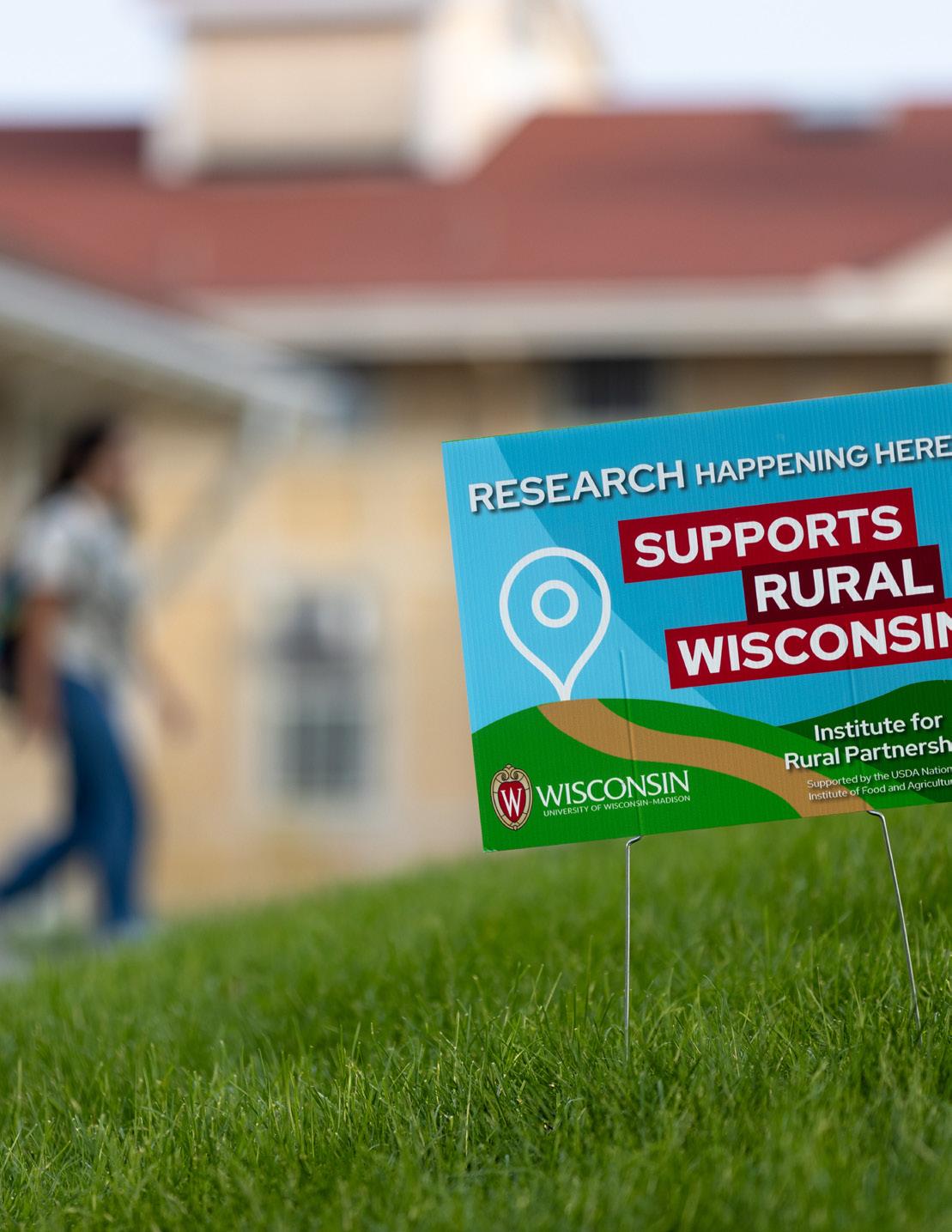
Water and Weather in Rural Wisconsin
UW’s Rural Partnerships Institute announces new projects focused on rural Wisconsin
By Heidi Zoerb, College of Agricultural and Life Sciences
Two new projects focused on responding to natural disasters and protecting water quality in rural Wisconsin received funding through the Wisconsin Rural Partnerships Institute (RPI) at UW–Madison.
FRONT AND CENTER
Photo by Michael P. King, College of Agricultural and Life Sciences
Each project fosters collaborations between interdisciplinary teams of university scientists, local non-profit organizations, elected officials, farmers, business owners and other neighbor groups.
This is the second round of projects funded by the Wisconsin Rural Partnerships Institute, which receives funding from the U.S. Department of Agriculture. Four earlier projects focused on rural livability, student mental health, Indigenous food systems and rural community health services were announced in 2023.
“These projects exemplify the Wisconsin Idea,” says Doug Reinemann, associate dean for extension and outreach in the College of Agricultural and Life Sciences at UW–Madison, “Internationally recognized experts in climate science, environmental protection, agricultural practices and other disciplines will join forces with local experts to collaboratively develop solutions that will benefit rural communities.”
Patrick Robinson, associate dean for agriculture, natural resources, and community development with the UW–Madison Division of Extension, says, “Extension has a long history of being present in Wisconsin towns and cities and working alongside local officials and volunteers to identify innovative solutions that make communities safer, healthier and more prosperous. We look forward to the positive outcomes from these new Rural Partnerships Institute projects.”
The first project — Preparing Wisconsin’s rural communities for amplified weather extremes — is led by a cohort of Nelson Institute faculty affiliates.
Working with farmers, local government officials and students in rural schools, this project aims to increase climate resiliency in three rural Wisconsin regions by improving identification of and preparation for impacts from extreme variations in temperature and precipitation. Billion-dollar weather disasters reached a record high nationally last year, and Wisconsin communities need plans to effectively address a natural disaster before it reaches
them. The project aims to strengthen rural Wisconsin’s capacity for proactive planning and management of amplified extreme weather events.
Project Leaders
Ken Genskow
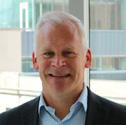
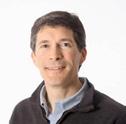

Department of Planning and Landscape Architecture professor; Division of Extension water resources specialist; and Nelson Institute faculty affiliate and water resources management program chair
Steve Vavrus
Wisconsin State Climatologist; Nelson Institute Center for Climatic Research assistant director and senior scientist
Paul Block
Department of Civil and Environmental Engineering associate professor; Nelson Institute faculty affiliate and Reid A. Bryson Distinguished Professor of Climate, People and Environment
The second project, which focuses on improving groundwater quality in Wisconsin’s Central Sands, is led by Jed Colquhoun, professor and extension specialist, Department of Plant and Agroecosystem Sciences.
UW’s Rural Partnerships Institute is part of a broader USDA-funded Institute for Rural Partnerships, housed at UW–Madison, Auburn University and the University of Vermont. The institute aims to promote equitable, resilient, and prosperous food and agricultural systems and expanded opportunities for rural community development. It fosters collaborations with community-based initiatives and local research, educational institutions and subject matter experts.
A longer version of this story was originally published by the College of Agricultural and Life Sciences.
RPI at Earth Fest
On the closing day of Earth Fest, the Nelson Institute’s Center for Climatic Research hosted a panel discussion centered on the mission and components of the RPI. Glenda Gillaspy, dean of the College of Agricultural and Life Sciences; Chris Kucharik, professor and director of the Wisconet; Patrick Robinson, associate dean with the UW–Madison Division of
Extension; and Steve Vavrus, state climatologist and director of the Wisconsin State Climatology Office; shared updates from the institute’s ongoing and upcoming projects. “We talk a lot in Extension about cocreation and codevelopment, and that means that the work that’s going on is in and with the communities that its trying to help,” said Robinson.
May 2024 21 FRONT AND CENTER

Welcome to Your Urban (Planning) Future
Municipal experiences enhance Shealynn Wegner’s academic experiences.
By Abigail Becker, UniverCity Alliance
Shealynn Wegner’s experiences working with two Wisconsin municipalities while at the University of Wisconsin–Madison solidified her decision to pursue planning and urban design as a career and illuminated the professional opportunities in local government.
Wegner is a senior and double majoring in landscape and urban studies and community environmental sociology. She is also earning certificates in environmental studies, architecture, graphic design, food systems, and leadership. A spring 2024 graduate, Wegner plans to start work with an architecture planning firm called ISG, Inc. in Green Bay.
“I am professionally interested in pursuing a degree in the planning and urban design field, especially focusing on sustainability and ethical community engagement, and how to create spaces for all kinds of people to improve life,” Wegner said.
As an Affirmative Action Student Professionals In Residence (AASPIRE) intern for the City of Madison, Wegner worked in the planning division on area plans, community engagement, and technical writing. She participated in the inaugural UniverCity Alliance Scholars Pro -
gram and worked with the Village of Cottage Grove on plans to make the community more friendly for pedestrians and bicyclists.
“I’ve been impressed to no end with the people who work in local government,” Wegner said. “They’re really just such passionate people.”
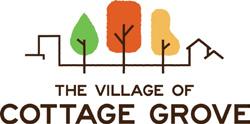
What led to your interest in community planning?
When I first started learning about environmental issues and climate change and how that disproportionately affects certain communities, I really felt this call to action to work on sustainability efforts. I started in environmental studies [and when I] was looking for a second major to go along with that, I came across community environmental sociology. It’s a really good foundation to learn how people’s identities create their intersectionality of experiences and understanding how built and natural environments are all connected to health outcomes
22 May 2024 STUDENT SNAPSHOT
and food systems. When I learned what urban planning was, I realized this is exactly what I wanted to do. How we can create these communities to work better for the people who live there?
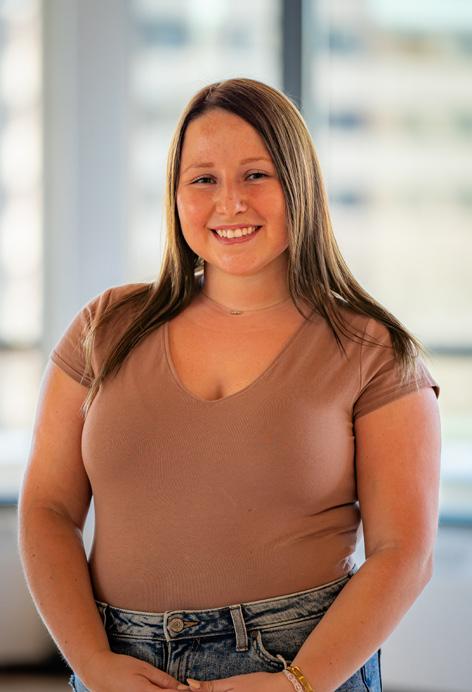
You had an internship with the City of Madison’s planning division. Could you share more about your experiences with the city?
I’ve done a ton of community engagement — general outreach and also specific public engagement. That’s been very, very valuable. [I’ve done] technical writing on entire chapters and call-out boxes, some graphic design work on infographics for the plan, as well as some 3D renderings of specific corridors — it’s been really amazing to work on all aspects of the plan.
What interested you in applying for the UniverCity Alliance (UCA) Scholars Program?
I first learned about UniverCity when I took Urban and Regional Planning 215: Welcome to Your Urban Future. UCA managing director Gavin Luter was the one who
was teaching at that time. I loved the idea of the partnership between communities and UniverCity. That’s exactly the kind of experience that I wanted to get. I was so happy to find out that I was selected for the program, and I was paired with the Village of Cottage Grove. The Welcome to Your Urban Future class was one of the first classes that I took that made me feel confident that urban planning was my future.
What project did you work on in Cottage Grove?
Cottage Grove wants to become a bicycle-friendly community as designated by the American Federation of Bicyclists. My primary objective in fall 2023 was to help them prepare to apply. The application actually closes in June. We took a step back, and we decided to create an implementation plan of how Cottage Grove can get to where they need to be to become. I drafted an implementation plan with recommendations. For their purposes, this implementation plan would sit within their bike and pedestrian plan that will get approved by committees in the next couple of months. That has evolved into me staying on with Cottage Grove. I’m helping with wording and technical writing in the plan and graphic design improvements and general layout of the document itself.
“The people who are taking charge of local government positions genuinely care for the best interest of the community. They’re fighting and pushing everyday.”
— Shealynn Wegner
As a student, how has working with the City of Madison and Village of Cottage Grove influenced your outlook on local government?
I’ve been impressed to no end with the people who work here. They’re really just such passionate people. It really has reaffirmed my confidence in the system, if you will, and understanding that the people who are taking charge of local government positions genuinely care for the best interest of the community. They’re fighting and pushing everyday to make those really cool things happen.
An extended version of this article was originally published by UniverCity Alliance.
May 2024 23
STUDENT SNAPSHOT
Shealynn Wegner
Sustaining Minds to Sustain the Environment
Environment and resources PhD student Audrey Stanton is passionate about sustainability, education, and “sustaining the sustainers.”
By Laila Smith
“Dear UW-Madison Students, Faculty, and Staff,
UW–Madison is developing a new sustainability strategy, and we need to hear from you to better understand sustainability literacy, culture, and demand in our campus community. Please complete the survey below to have your voice heard.”
If you were on campus last fall you likely received this email asking you to participate in a campuswide sustainability survey. This survey, along with many other sustainability initiatives across the University of Wisconsin–Madison campus, is one of the projects led by environment and resources PhD student Audrey Stanton. “Addressing these questions within our campus context is a critical component of my work,” Stanton says, “and understanding the connections between environmental, economic, and social factors is essential for effective decision-making and sustainable action at UW–Madison.”
Stanton grew up in Montana, where the outdoors were a big part of her childhood. “Anytime my brother and I were looking for something to do, we’d go outside and play in the grass with our dogs, dig in the garden, or explore the woods behind our house,” she says. Stanton lived in a glacial valley surrounded by mountains, and would frequently go hiking, camping, or swimming with her family — one of their favorite places to visit was Glacier National Park.
Stanton’s love for the outdoors grew into a love for the environment, thanks to her involvement with her high

school’s environmental club. “I had a fantastic teacher who ran the environmental club and convinced me to join,” Stanton says. With the club, she helped manage the school’s recycling program and submitted a grant that funded a salsa garden for their high school, allowing students to grow tomatoes, cilantro, peppers, and other salsa ingredients. “I loved the work and I loved the people, so it was such an easy decision to continue my passion in college,” she says.
After earning her undergraduate degree in sustainability sciences from Cornell University, Stanton pursued a master’s degree in the Nelson Institute’s environment and resources program. During her master’s coursework, Stanton worked with Professor Emerita Cathy Middlecamp and one of her peers to create the Campus Sustainability Map for her master’s project. This map is based on the United Nations’ Sustainability Development Goals (SDGs), and showcases the variety of sustainability efforts being made across the UW–Madison campus. “The map shows a visual description of campus features that pertain to sustainability — whether that be social, economic, environmental, or a combination of the three,” Stanton says. “It’s been viewed over 17,000 times, which goes to show that people are using it and loving it.”
Now, she’s pursuing a PhD in environment and resources at the Nelson Institute as well. “One of my favorite things
24 May 2024 STUDENT SNAPSHOT
about the Nelson Institute is its interdisciplinary approach to education,” Stanton says. “Coming out of college I had two interests I wanted to pursue, sustainability and education, and the Nelson Institute is a place where I could do both,” she says. For Stanton, being part of a cohort consisting of people specializing in a variety of fields helps promote collaboration and tackling issues from a variety of perspectives. She says, “everyone brings their own expertise to the Nelson Institute, and we can all work together for a greater purpose.”
“I find it very meaningful to be part of sustainable solutions in the face of climate change.”
— Audrey Stanton
In addition to pursuing a PhD at the Nelson Institute, Stanton works as a project assistant with UW–Madison’s Office of Sustainability (OS). The OS was established in 2012 with a vision to created campus as a living laboratory for sustainability — an idea recently solidified by UW–Madison’s new environmental sustainability initiative. With the OS, Stanton channels her passions for education and sustainability into promoting sustainability across campus — for example, through the Sustainability Symposium.
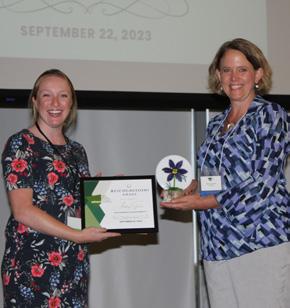
Currently, Stanton is working with the OS on analyzing responses from the campuswide sustainability survey, a longitudinal study that concluded in the fall. The team sent out two surveys — one in 2021, and another in the fall of 2023 — and Stanton is leading the efforts in analyzing how sustainability literacy and culture is progressing among UW students, staff, and faculty. “The survey supports our efforts to reach STARS [Sustainability Tracking, Assessment & Rating System] Gold by 2025” — one of the sustainability initiative’s goals — “while also providing insights into the effectiveness of sustainability engagement and education initiatives,” Stanton says.
This isn’t the only survey that Stanton has worked on — with the support of her PhD advisor Andrea Hicks and Nelson Institute Dean Paul Robbins, Stanton surveyed Nelson Institute staff to learn more about how the COVID-19 pandemic affected their commuting behavior. In particular, Stanton focused on how their travel habits impacted sustainability, benefiting people, the planet, and the economy. “The survey shows the staff overwhelmingly love to work in a hybrid manner,” Stanton says, calling the arrangement “a perfect solution” to balancing workplace productivity with transportation sustainability. “This truly is a campus as a living laboratory project, where Stanton is exploring how policies contribute to the carbon footprint of campus,” says Hicks.
Due to Stanton’s work in these various campus sustainability initiatives, she was named the 2023 Emerging Graduate Leader in Sustainability by the Upper Midwest Association for Campus Sustainability. After earning her PhD, Stanton hopes to continue doing place-based sustainability education work.
“I want to continue doing sustainability in education and outreach in whichever role I have post-grad,” Stanton says. “Something that’s important to me is supporting and encouraging the younger generations working in sustainability fields — as things get tougher, you have to keep fighting the fight.” One of the ways Stanton likes to “fight the fight” is by doing something that she and her coworkers at the OS call “sustaining the sustainers:” supporting the people working in sustainability so they can continue to support the environment. “We try to emphasize to folks that they’re people first, then they’re students, and then they’re interns. It’s important to find that balance to avoid burnout and keep pursuing the work you’re doing. Climate anxiety can be overwhelming, and we encourage students to take care of themselves, too,” she says.
How does Stanton navigate working in the stressful — and sometimes demoralizing — field of sustainability? “Even if I weren’t in this field of work I would still be thinking about sustainability issues regularly, so it brings me a lot of purpose to be part of the problem-solving. I find it very meaningful to be part of sustainable solutions in the face of climate change.”
Stanton’s efforts in working towards sustainable solutions exemplifies the intersection between passion, action, and education in sustainability. From working on projects like the Campus Sustainability Map, to conducting sustainability research through surveys, to “sustaining the sustainers” at the Office of Sustainability, Stanton’s work affects people across the UW campus and beyond.
May 2024 25 STUDENT SNAPSHOT
Stanton receiving the 2023 Emerging Graduate Leader in Sustainability Award from the Upper Midwest Association for Campus Sustainability.
Photo courtesy of Upper Midwest Association for Campus Sustainability
The Storytelling Side of Science Environmental studies alum Nyal Mueenuddin documents the world through filmmaking.
By Anica Graney
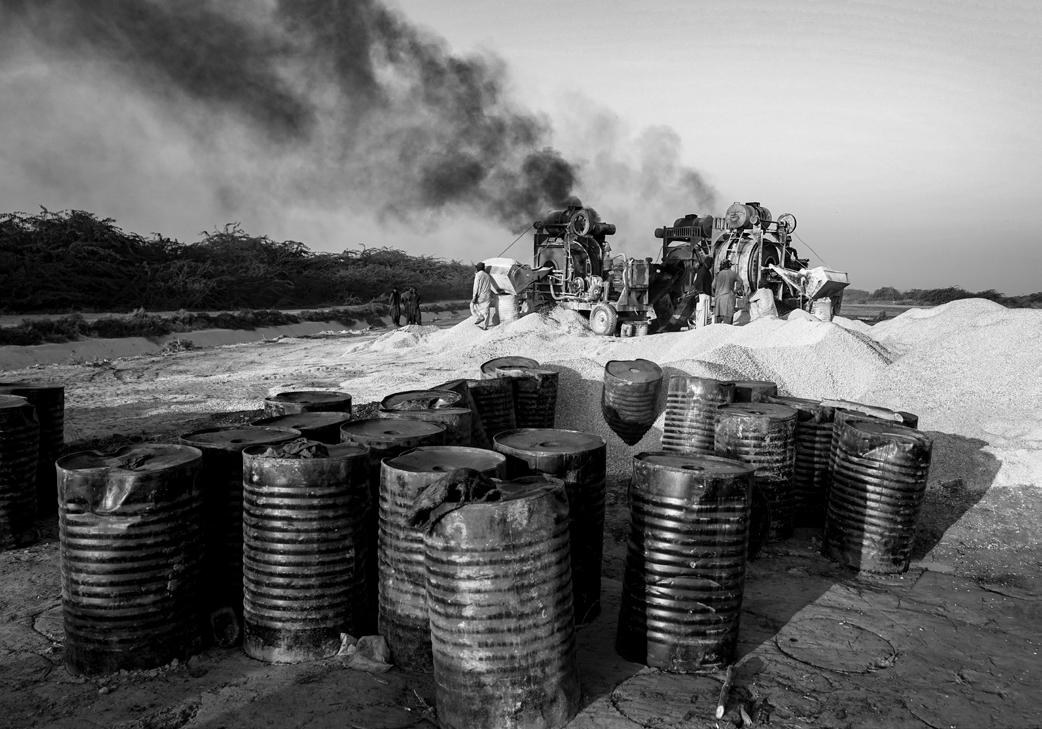
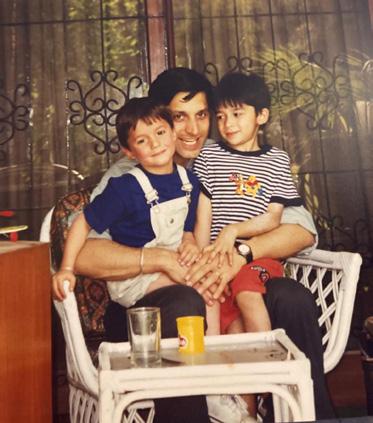
Surrounded by mangoes, Nyal Mueenuddin remembers his childhood as fun, sweet, and sticky. His parents owned a mango farm along the Indus River in Pakistan’s southern province of Punjab, and it was here that his connection with the environment began, and where a piece of him will always live. “Mangoes were a big part of my childhood,” he said. “I lost my first tooth biting into one.”
Mueenuddin’s parents were not only mango farmers, but both worked for the United Nations and international non-governmental organizations, which took Mueenuddin around the world as he grew older. After bouncing around from place to place and completing high school along the way, Mueenuddin traded mangoes for cheese curds and applied to attend the University of Wisconsin–Madison where he was granted a Foreign Language and Area Studies (FLAS) fellowship for South Asian studies through the U.S. Department of Education.
26 May 2024 ALUMNI SPOTLIGHT
A photo taken by Mueenuddin along a delta. Photos courtesy of Nyal Mueenuddin (7)
Mueenuddin (left) with his family while growing up on a mango farm in Pakistan.

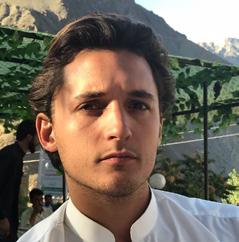
In college, Mueenuddin’s interests blossomed into environmental studies, communication, photography, political science, and, of course, South Asian studies. “I really loved going to a big university like UW–Madison because I could scroll through hundreds of different courses and find really niche topics that I was interested in,” Mueenuddin said.
One of the classes that especially stood out to him while completing his degree was History, Geography, and Environmental Studies 460: American Environmental History with Nelson Institute Professor Emeritus Bill Cronon. “That was probably the best class I took at UW–Madison,” Mueenuddin said. “[Cronon] inspired me a lot, not just because of the subject matter, but by his way of teaching. He was a storyteller.”
As Mueenuddin continued through college, he kept Cronon’s creative storytelling in mind and employed it wherever possible, including his capstone course with Professor Alfonso Morales. The course focused on food deserts, food rights, incarceration, and the environment, and when Mueenuddin pitched the idea of creating a documentary film for the class instead of writing a final paper, Morales was all for it. At the end of the course, Mueenuddin turned in a 20-minute film about the revolving prison door in Madison and the efforts of a Black farmer as he helped people stay out of prison by learning how to farm.
“Being involved with the Nelson Institute was essential in building a foundation of knowledge, interest, curiosity, and a feeling that I was capable of doing things a little bit outside of the box.”
— Nyal Mueenuddin
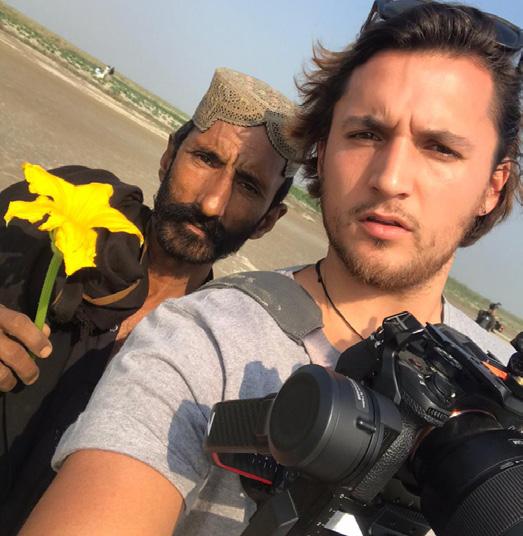
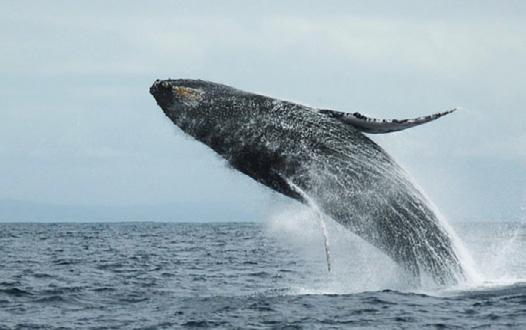
May 2024 27 ALUMNI SPOTLIGHT
Mueenuddin takes a selfie while working on an episode of the BBC’s Planet Earth III
Mueenuddin’s career in documentary photography and filmography begins off the coast of Madagascar.
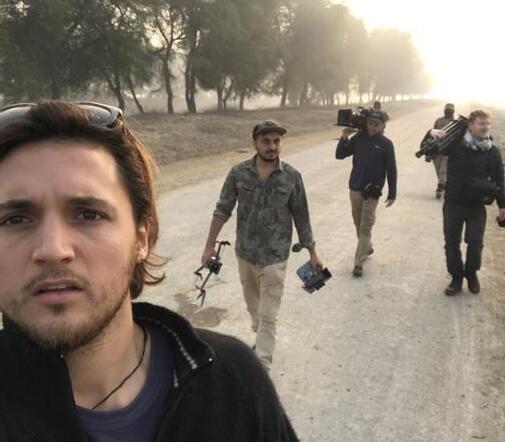
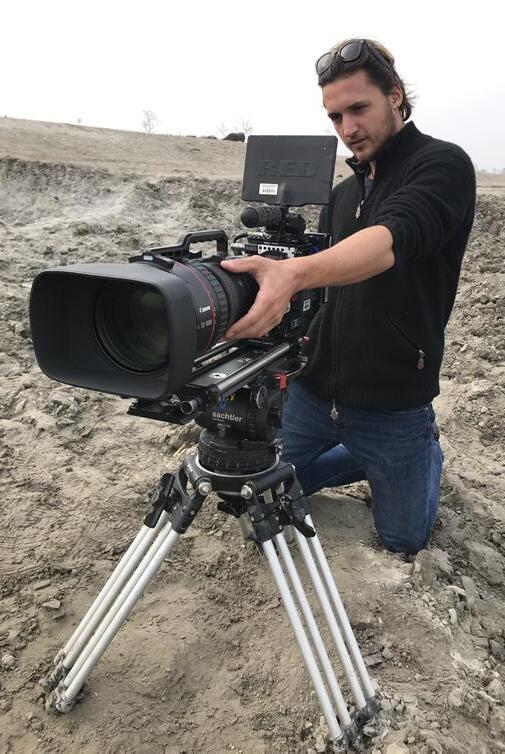
After graduating from UW–Madison, Mueenuddin began working as a junior researcher with a team studying humpback whales in Madagascar. At that time, he thought he wanted to pursue a career in marine science, but as he worked, noticed that there was a need for photos and videos of what the researchers were doing, which launched him back into the storytelling side of science. “Being involved with the Nelson Institute was essential in building a foundation of knowledge, interest, curiosity, and a feeling that I was capable of doing things a little bit outside of the box,” Mueenuddin said.
He then moved back to Pakistan and began working with the World Wildlife Foundation doing photojournalism around the country. After two years of that, Mueenuddin was put in touch with the BBC, which wanted his help with an episode of Planet Earth III that focused on the Indus river dolphin. “They sent a team out, we shot, and it was super successful,” Mueenuddin said. “After that, I decided that I wanted to be with other filmmakers and that I had more to learn about the craft of filmmaking.”
Mueenuddin enrolled in a year-long master’s program at the University of the West of England in the United Kingdom, regarded as the capital for natural history filmmaking. After completing that program, Mueenuddin set off to create a documentary about the aftermath of Pakistan’s devastating 2022 floods that displaced 30 million people and had a third of the country underwater. He traveled 3,000 kilometers down the Indus River where most of the flooding happened and interviewed 40 people about their stories and memories of living along the river and how it has changed since the flooding.
Mueenuddin is now screening the film in Pakistan and plans to start a documentary production company based in Islamabad that will tell climate, environment, wildlife, migration, and human stories. “It’s a big step, but I feel like all of the experiences I’ve had up until now have prepared me for it, including being at the UW,” he said.
For students looking to follow in his footsteps, Mueenuddin encourages them to just go for it and jump in however they can. “Filmmaking is fun,” he said, “And if you can start off by experimenting with things you think are interesting, it helps stoke a fire in you that ultimately makes the whole future feel more reassuring.”
28 May 2024 ALUMNI SPOTLIGHT
Top: Mueenuddin and the BBC film crew travel through Pakistan to capture footage for the recent freshwater episode of Planet Earth III. Above: Mueenuddin controlling the camera for an episode of Planet Earth 3.
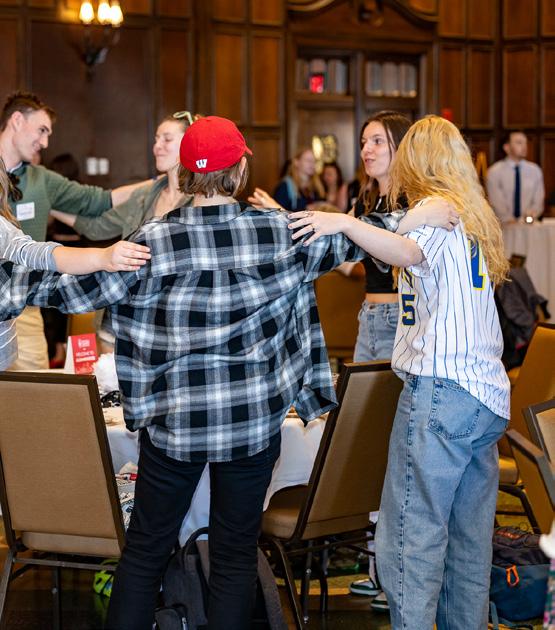

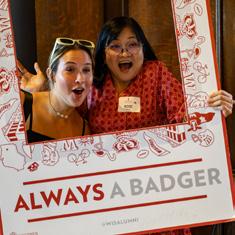
Congrats, Grads!
Last week, hundreds of Nelson students entered alumnihood.
Last weekend, nearly 400 Nelson Institute students turned their tassels to become UW alumni. The Friday ceremony, held at the Kohl Center, celebrated doctorates, MFAs, and medical professionals, including several Nelson PhD students. Then on Saturday, nearly 350 Nelson undergraduates and dozens of graduate students tossed their caps with thousands of their peers at Camp Randall Stadium. Before the campuswide festivities, we celebrated our students at our annual Spring 2024 Graduation Celebration, held at Tripp Commons in Memorial Union. Check out the fun!
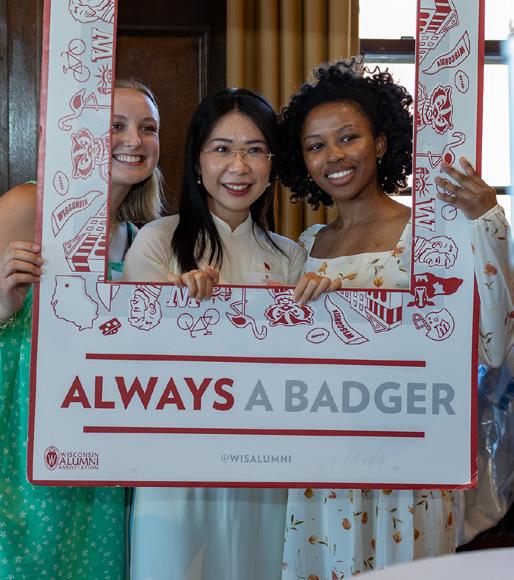
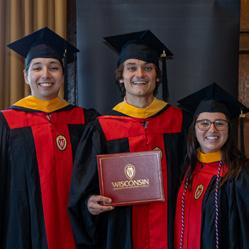
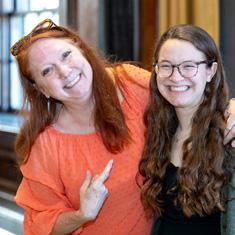
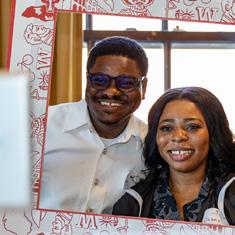
May 2024 29 ALUMNI SPOTLIGHT
Photos by Hedi LaMarr Rudd (7)
2024 Spring Scholarship Recipients
Congratulations to the recipients of this semester’s philanthropy-funded scholarships!
Each year, the Nelson Institute offers numerous scholarships for both undergraduate and graduate students, all of which are made possible by generous donor support. Congratulations to the winners of the spring 2024 philanthropy-funded scholarships!
Arthur B. Sacks Award for Artistic Expressions of Human and Environmental Relationships
Brynn Mancusi
Arthur B. Sacks Award for Graduate Excellence in Environmental Studies and Sustainability
Emily Azevedo-Casey
Arthur B. Sacks Award for Undergraduate Excellence in Environmental Studies and Sustainability
Sarah Sprinkman
Center for Climatic Research Bryson Scholarship
Paige Alexandria Bartels
Elizabeth Berg
Matilyn Bindl
Francisco Campos Arguedas
Ian Franda
Collin Queen
Sadegh Ranjbar
Rudradutt Thaker
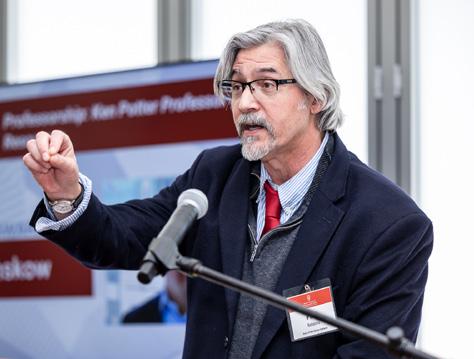
Center for Culture, History, and Environment Art Travel Award
Inigo Acosta
Tessa Archambault
Kallista Bley
John Canfield
Marina Cavichiolo Grochocki
Thi Le Thu Dinh
Laura Lawler
Ben Lebowitz
Samm Newton
Amani Ponnaganti
Nicolas Rueda Rey
Center for Ecology and the Environment Aldo Leopold Graduate Research Award
Erica Schoenberger
Sarah Tolbert
Charles G. Meyer Undergraduate Study Abroad Travel Award
Emily Johnson
Charlotte Zieve Scholarship
Dorothy Lsoto
Corporate Sustainability Internship
Sarah Ashland (C-Motive)
Nick Brennan (Findorff)
Will Hazeltine (TRC)
Maya Herzog (Lands’ End)
Kevin Hoa-Quy Le (Reynolds Transfer and Storage)
Henry Severson (Oshkosh)
James A. Schleif and William H. Morley Undergraduate Study Abroad Travel Award
Emily Beinert
30 May 2024 ADVANCEMENT
Dean Paul Robbins speaks at the scholarship reception, held Friday, April 19 at the Discovery Building. Photos by Heidi Rudd (2)
Jim Miller Graduate Scholarship for Excellence in Water
Resources Management
Alayne Kulp
Kikkoman Environmental Studies Scholarship
Lily Engel
Leo Strand
Linda Wernecke Marshall Graduate Award in Environmental Studies
Colleen Henegan
Hannah Kass
Reid Bryson Undergraduate Scholarship
Molly Claus
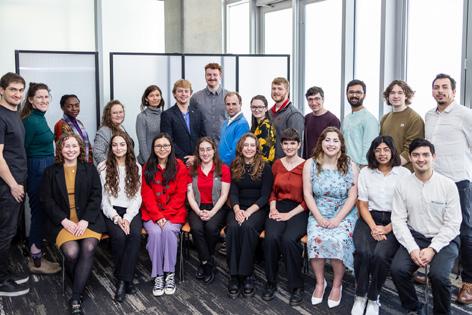
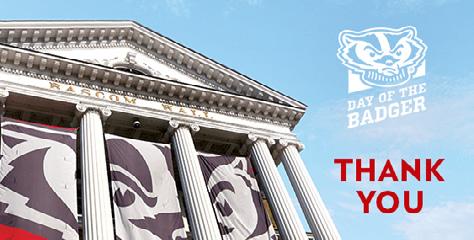
DOLLARS RAISED
$20,619 Total Gifts: 111 $10,000 Matching Funds 4,000+ Social Impressions 1,848 Minutes
Support NELSON
Interested in supporting the Nelson Institute?
There are many ways to contribute to the Nelson Institute — participating in our events, mentoring our students, providing connections to your personal networks, and making financial gifts. All of these are necessary and important to us, and we invite you to invest in our community in the way that makes the most sense to you.
Learn more about all of the great academic programs, research centers, and public programs we offer.
Gifts in any amount are needed and appreciated!
May 2024 31 ADVANCEMENT
Scholarship recipients at the annual scholarship reception.
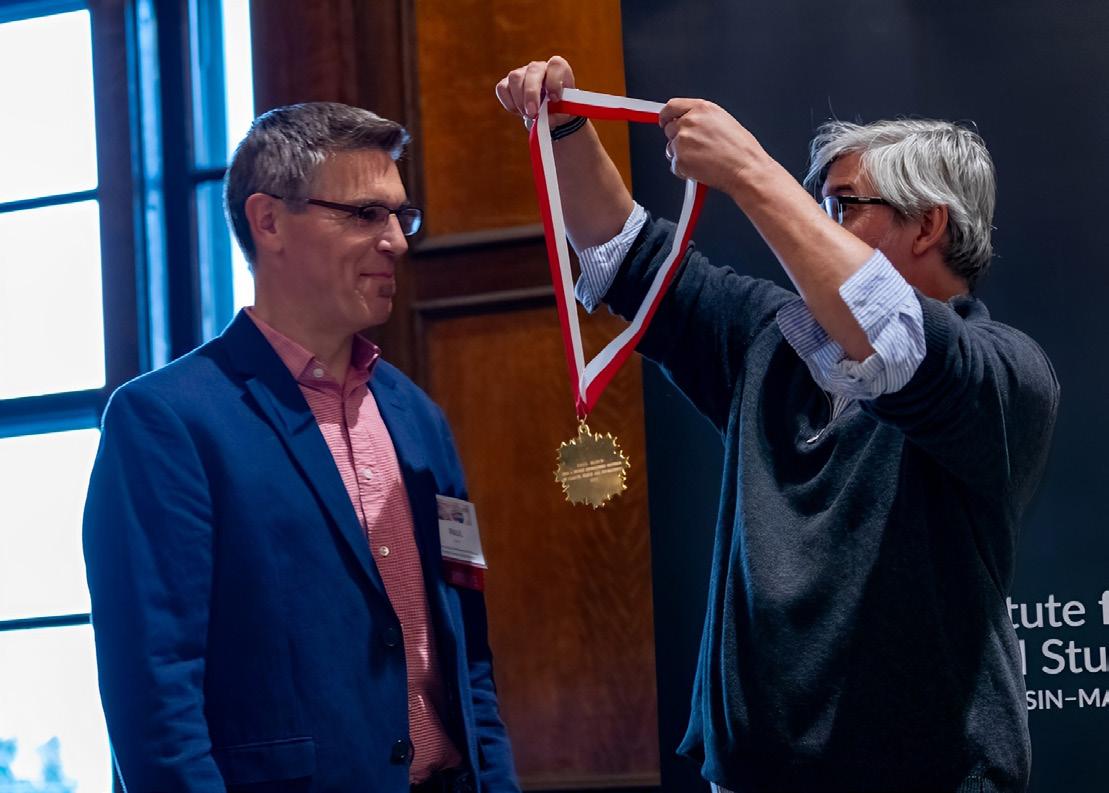

the Terrace
Friday, Sept. 27, 2024 | Tripp Commons, Memorial Union
Don’t miss this chance to reconnect with your fellow Nelson Institute alumni, meet current students and faculty, and of course, enjoy a sunset over Lake Mendota.
Registration and more information coming soon!



Save the Date! 2024 Rendezvous on



 Paul Robbins Dean, Nelson Institute
Paul Robbins Dean, Nelson Institute


































































